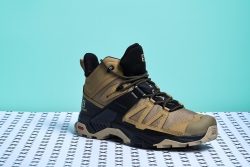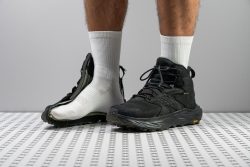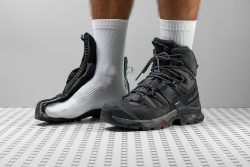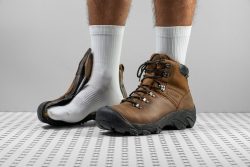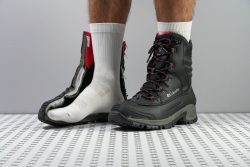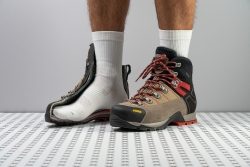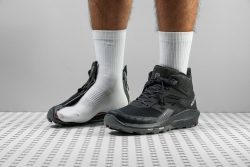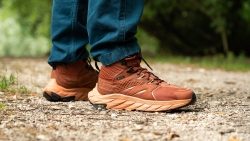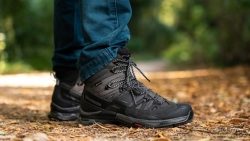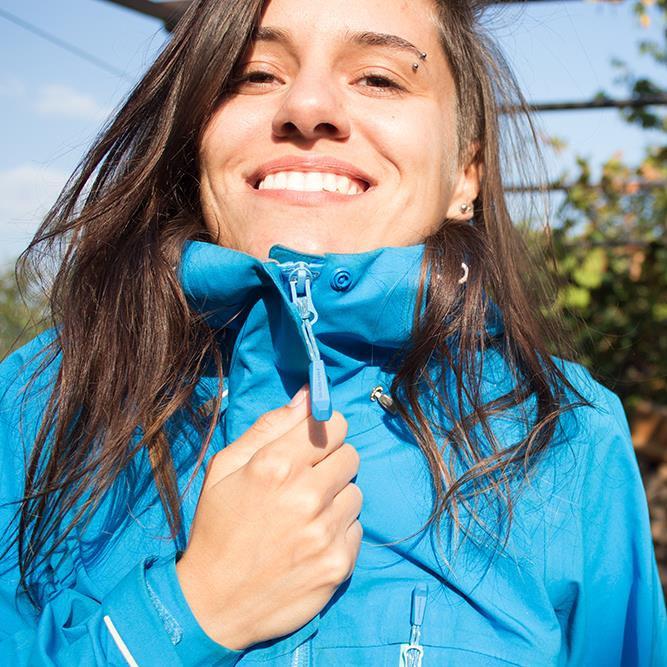7 Best Waterproof Hiking Boots in 2024
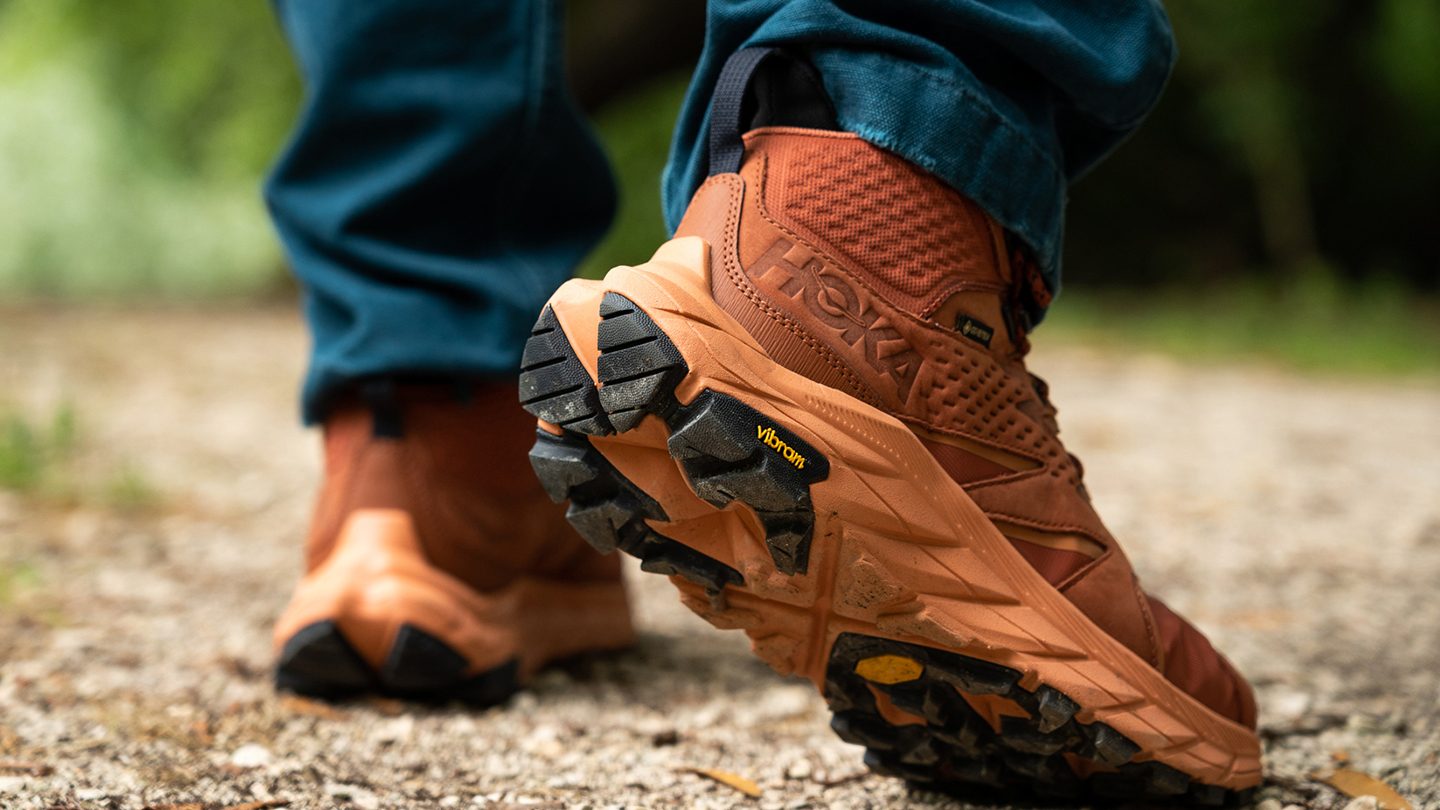
We buy shoes ourselves. We earn commissions when you buy through us, at no extra cost. Why trust us
Other than keeping your feet nice and dry, waterproof hiking boots come in a variety of designs to match different types of hiking adventures. That being said, we have created a guide that will help you navigate this vast selection.
After thoroughly testing waterproof hiking boots, we have selected the top picks in different categories. Are you looking for a rugged boot for backpacking? A lighter one for speed or urban hiking? Perhaps you only need it for occasional trips and don’t want to spend over £150? See our recommendations to find the one that serves you best.
Also, check out our guide section to learn more about Gore-Tex, the different levels of water protection, how and when to use the gaiters, and so on.
How we test waterproof hiking boots
Here at RunRepeat, we gather, collect, and analyse data from our very own testing procedures. Primarily, we buy all the waterproof hiking boots we want to test with our own money. We are very stern about this because we only believe in delivering impartial reviews.
Secondly, we go crazy with the boots. We hike in them and subject them to different landscapes, from the steepest inclines to the deepest canyons, while passing different watercourses or hiking while raining.
Lastly, we unravel more data by conducting lab tests on the shoes. This is to discover the science and numbers behind how the boots perform. Also, we cut the shoes into pieces, giving us a fuller view of everything that makes the boot!
Best waterproof hiking boots overall
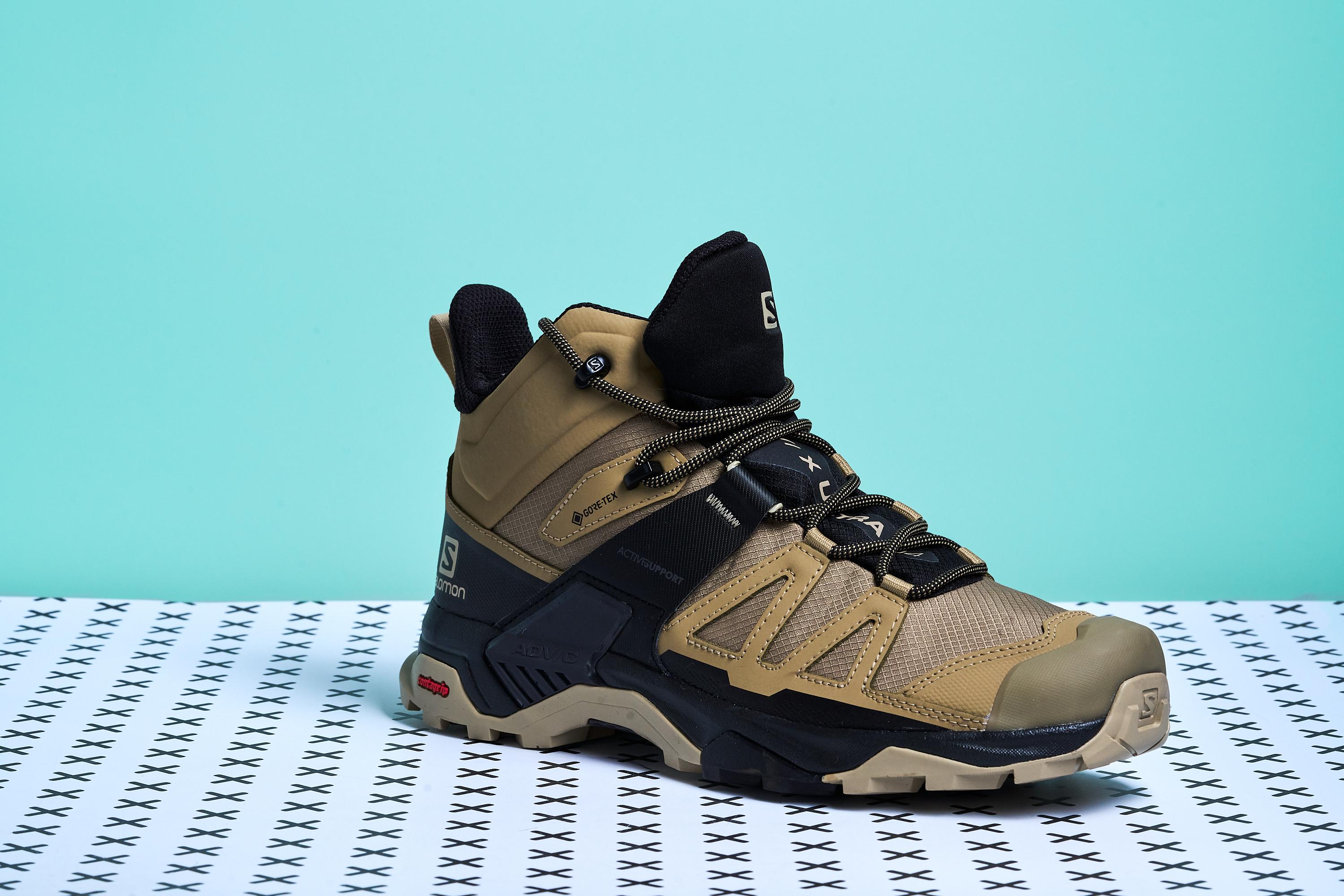













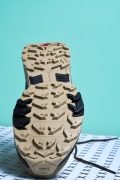





What makes it the best?
When we look for the best overall waterproof hiking boot, it’s got to be supportive, grippy, lightweight, keep the water out, and we want our feet to be comfortable over long distances. We found all of that in the Salomon X Ultra 4 Mid GTX!
On our hikes, our feet felt supported by the high ankle collar, and we felt secure even when carrying heavy loads. We can’t get enough of the Contragrip sole, which works wonders on practically anything. The 5.1 mm lugs are 16% deeper than average, and we walked confidently even on loose ground.
We measured the flexibility of the boot with a force gauge by bending the boot to 90°. The average measurement is 42.8N - at 27.9N the X Ultra Mid GTX is a really flexible boot! It gave us a lot of confidence as it helped our feet flex and grip the ground underfoot.
For hikers who like a bit of ground feel, the 31.5 mm midsole heel height is a bonus (the average is 35.8 mm), and it also helps to keep the weight down. At just 13.8 oz (390g), the X Ultra Mid GTX is almost as light as a hiking shoe, but with the extra support afforded by a boot. Given that the average weight for hiking boots is 19.5 oz (553g), this is a godsend! It’s also got some of the most amazing waterproofing we’ve seen - the gusseted tongue and high collar keep the water out, even when standing in running water for over a minute!
For winter hikers, we recommend looking elsewhere. We simulated winter conditions by putting the boot in the freezer for 20 minutes and then testing the flexibility with a force gauge. We recorded an unbelievable 126% decrease in flexibility compared to room temperature, which impacts the boot’s performance.
Pros
- The boot of choice for multi-day hikes
- Lightweight
- Waterproof
- Excellent grip
- Supportive midsole
- Detailed ground feel
- Great ankle support
- Protective
- Perfect lacing system
Cons
- Midsole may be thin for some
- Very stiff in colder climates
Waterproof hiking shoes with the best cushioning
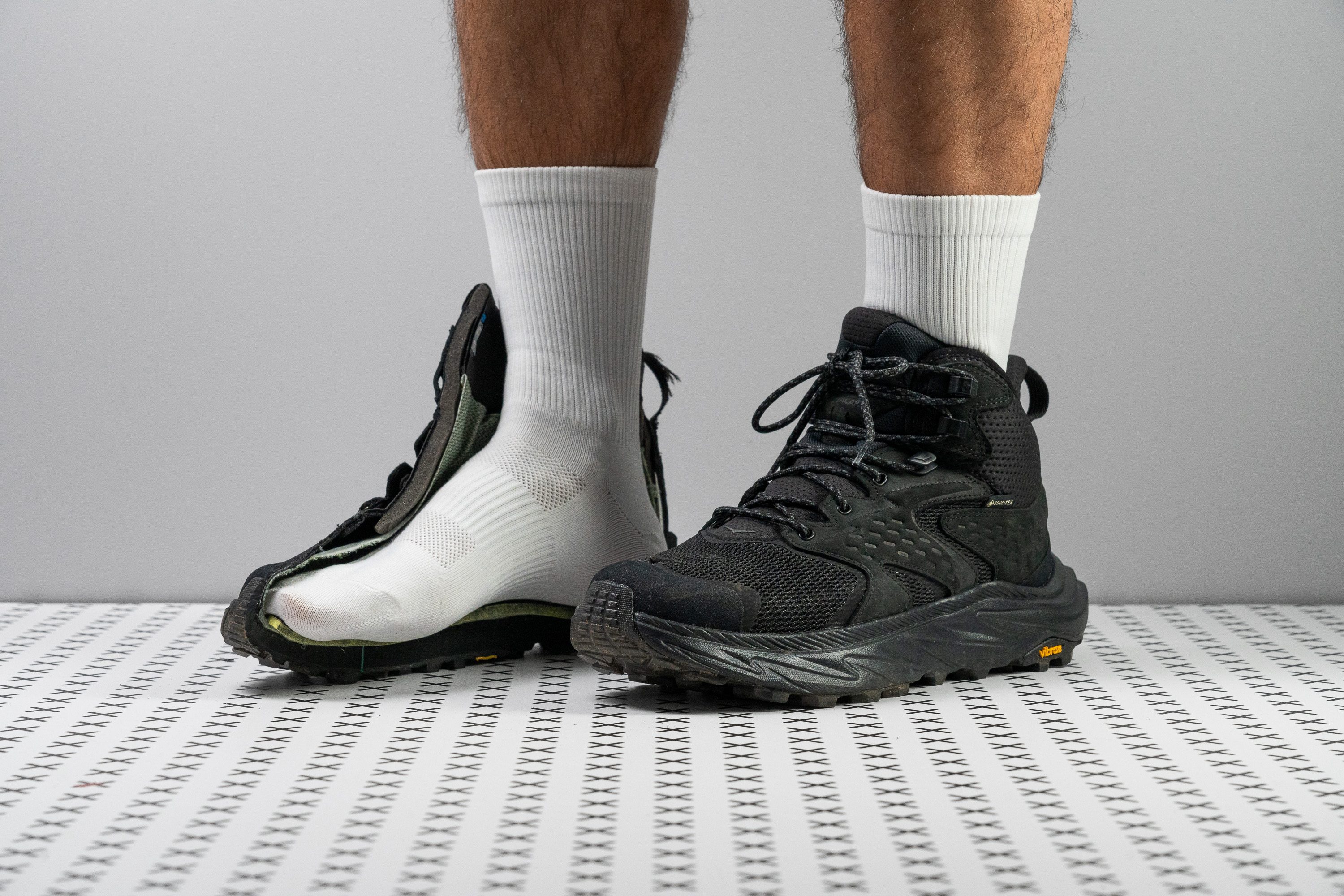










































What makes it the best?
With exceptional impact protection and effective waterproofing that doesn’t weigh us down on our mountain treks, the Hoka Anacapa 2 Mid GTX is our best cushioned waterproof hiking boot. We discovered in the lab that it has a wide base that boosts stability, making it an excellent choice for longer day hikes when more comfort and less fatigue are needed.
We found plenty of foam to shield us from sharp rocks and soften hard landings, notably under the forefoot which has an extra 2.8 mm material vs. average. We measured the cushion with our durometer to be a firm 30.0 HA, which brought a springy yet surefooted sensation.
Having tested this boot in wet grass, rain, and shallow streams, our feet remained completely dry. The upper didn’t let any smoke pass through in our breathability test, earning the lowest 1/5 score. It delivers excellent waterproofing through its thick leather overlays and Gore-Tex lining.
While cushioned and airtight shoes tend to weigh heavier, the Anacapa 2 Mid GTX remarkably weighs only 17.4 oz (494g), 7.7% lighter than average. This makes it our top choice for long hikes, as we can put in more miles before our feet get tired from hauling extra loads.
While protective in many scenarios, we can’t recommend this boot for challenging terrains. This boot will feel too cumbersome as these trails require more agility and ground sensitivity.
Pros
- Well-cushioned for long miles
- Very comfortable step-in feel
- Highly stable platform
- Excellent waterproofing
- Solid grip, even on wet terrain
- More flexible than other boots
- Decent durability for moderate hikes
- A lot of sustainable components
Cons
- Extended heel catches rocks
- Not for technical terrain
- Gained 2 ounces
Best waterproof hiking boots for backpacking
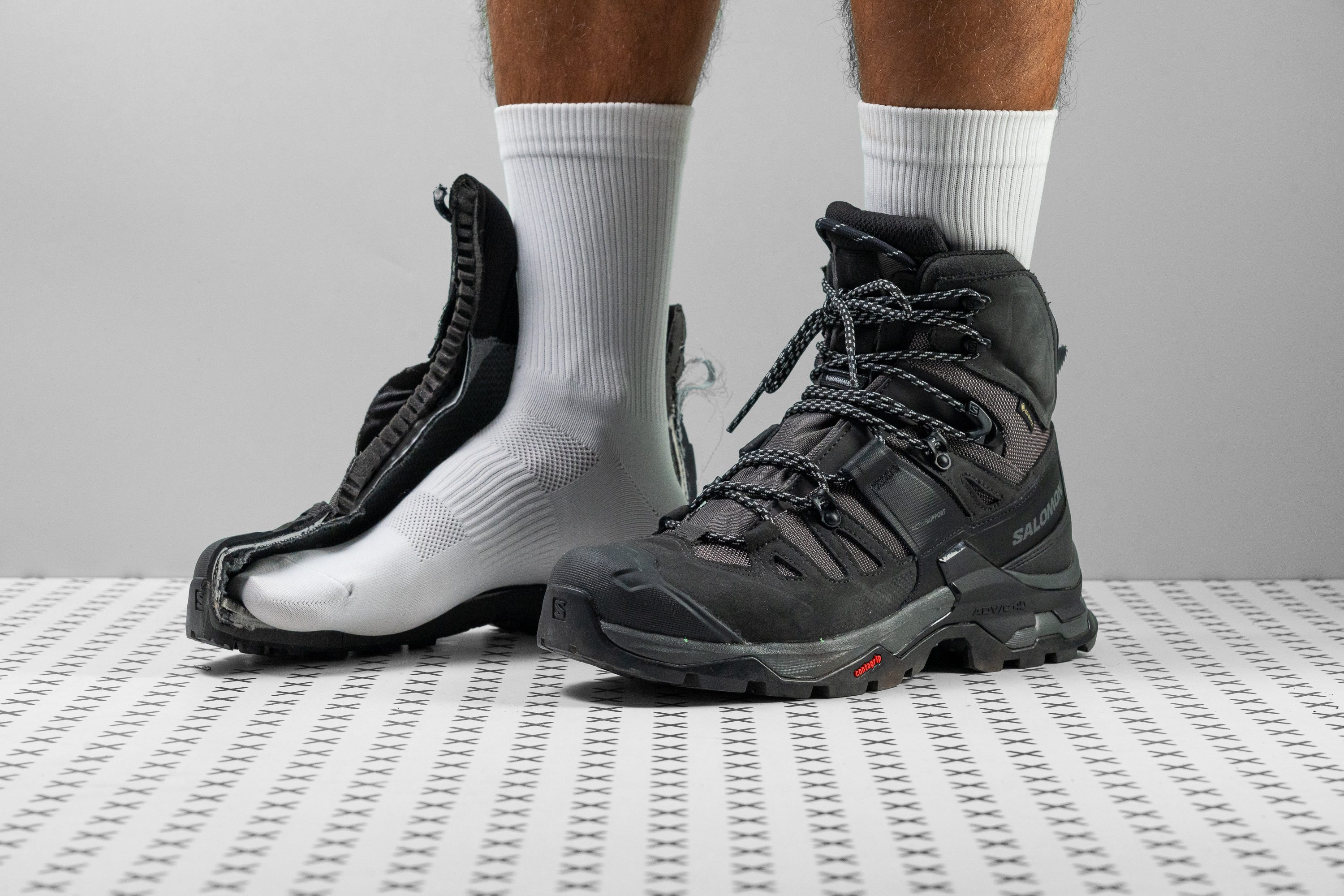













































What makes it the best?
Since we can only pick one waterproof hiking boot that is best for backpacking, it has to be the Salomon Quest 4 GTX, without a doubt. It screams support and stability, which is a must for any heavily loaded adventurer, and the Gore-Tex lining is the star of rainy days on the trail. It even performs well in the cold, meaning those early- or late-season treks are still on the cards!
Rarely has such a supportive hiking boot passed through our lab! Salomon’s innovative integrated support system clamps our feet securely into the boot without constricting. The heel counter scored the stiffest rating of 5/5, so heel slippage was non-existent, even on steep inclines. After our manual twisting tests, we rated this boot a very rigid 5/5 for torsional flexibility. Rolling an ankle is not an option, either!
The Gore-Tex lining runs high up the ankle, keeping our feet dry even during stream crossings. The particularly high collar and fully gusseted tongue are especially helpful at keeping water and debris out of the boot. Dry feet mean no blisters - especially important on multi-day hikes.
In the lab, we simulated winter conditions by putting the boot in the freezer for 20 minutes before testing the midsole hardness. At room temperature, the midsole sits at the average of 27 HA. In the cold, it increases only a little, to 32.9 HA. In practice, this means the midsole will still be almost as soft and comfortable as it would be on warmer days without breaking in.
Unfortunately, while the 38 mm heel stack provides a load of cushioning, the boot has an overall heel-to-toe drop of 18 mm, 5.6 mm higher than average. This may be too much for some people, so we don’t recommend Salomon Quest 4 GTX to hikers who prefer a more natural feel to their boots.
Pros
- Exceptional durability
- Top-notch waterproofing
- Excellent impact protection
- Highly secure ankle support
- Fantastic stability
- Comfortable in-boot feel
- Effective grip on various terrain
- Fits as expected
Cons
- A bit heavy
- Gets very stiff in cold
Best waterproof leather hiking boots
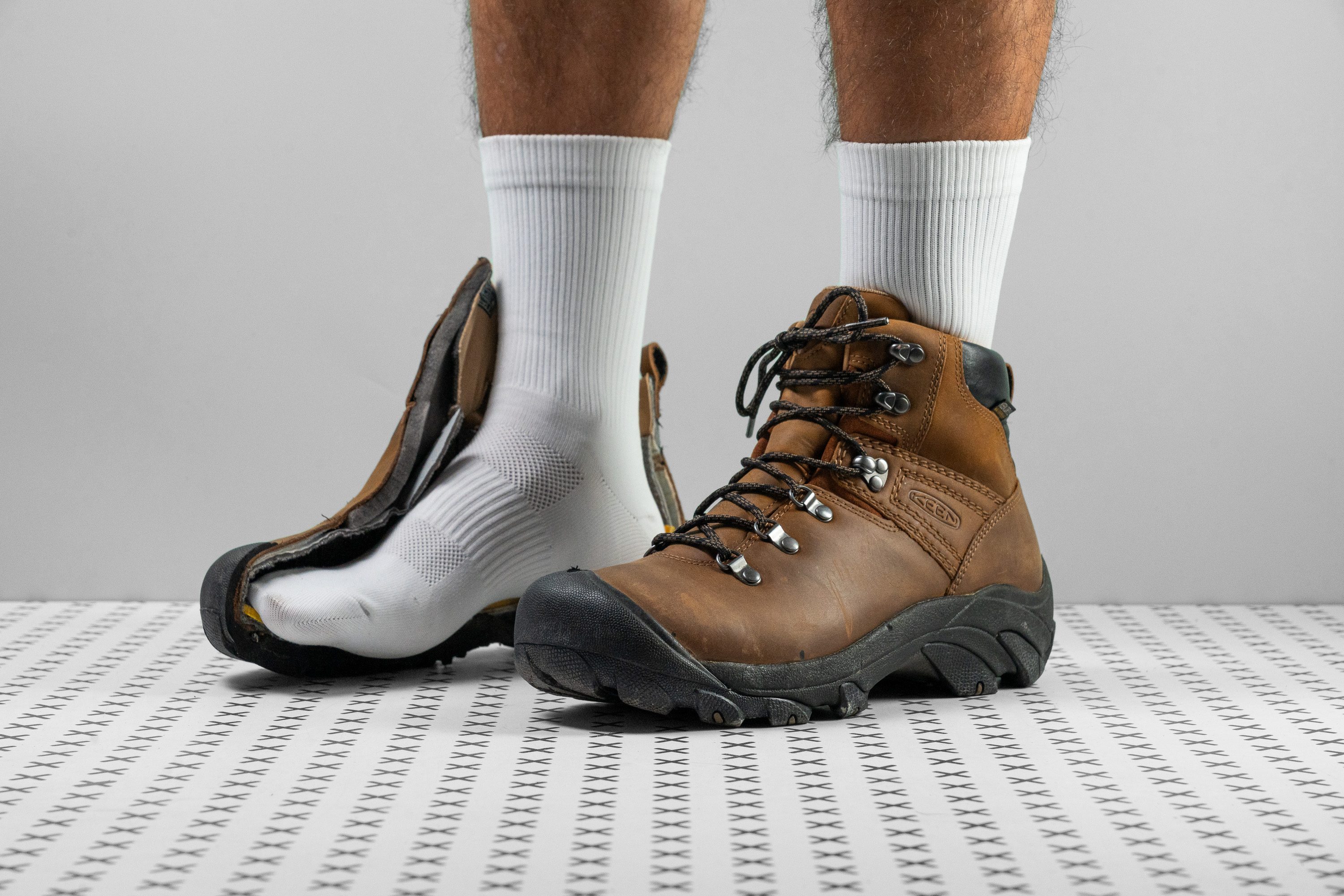











































What makes it the best?
For a comfortable and supportive hiking boot for backpacking and day hikes, the KEEN Pyrenees is up there with the best of the best. 5-star waterproofing and a superbly plush midsole make for comfortable hikes in all weather. The reinforced toe box extends this boot’s shelf-life, leading us to vote for the KEEN Pyrenees as the best waterproof leather hiking boot.
The leather upper is complemented by the KEEN.DRY membrane, which makes this boot completely impenetrable to water. Splashing across streams and hiking for hours in the rain wasn’t enough to get our feet wet. In the lab, we pumped smoke into the boot to test for pores in the membrane. The KEEN Pyrenees scored a perfect 5/5, the least breathable and therefore most waterproof. These are our go-to boots for multi-day hikes when we prioritise our feet’s comfort and well-being.
Speaking of comfort, these leather boots break the mould by being unbelievably comfortable straight out of the box. We pressed a durometer to the midsole in the lab and were astounded by the results. Registering just 15.9 HA, it is 60% softer than our lab average! Even after 20 minutes in the freezer, they were only slightly firmer, and still 32% softer than most other shoes at room temperature! It makes a delightful change from stiff and solid leather boots, and our feet thanked us during our long test hikes. These boots are also consistent in winter, behaving as we might expect regardless of the temperature outdoors.
KEEN’s characteristic wide toe box is of course present on the KEEN Pyrenees, yet it's a toe box with an added extra. The rubber toe cap prevents damage and scuffs to the leather upper while hiking on rough, rocky terrain. To get a handle on just how tough the toe cap is, we subjected it to our Dremel in the lab. Spinning at a rate of 5K RPM at 3.2N, after 12 seconds, the Dremel left the slightest dent in the rubber. We awarded the boot the maximum score of 5/5 for durability. This boot took some bumps and scrapes during our test hikes, and it came back looking none the worse for wear.
Leather boots will never break the record for lightweight boots, but in the case of the KEEN Pyrenees, they weigh in over the odds. Tipping our scales at 21.7 oz (615g), they are 3.6 oz (103g) heavier than average. We don’t recommend the KEEN Pyrenees to hikers looking for a lightweight hiking boot.
Pros
- Premium nubuck leather quality
- Top-notch waterproofing
- Tonnes of impact protection
- Surprisingly soft cushioning
- Excellent stability and support
- Very wide, accommodating toebox
- Convenient lacing system
Cons
- Too bulky and heavy
- Tongue edges dig into shins
- Lacks traction for mud, ice, and snow
Best waterproof insulated hiking boots
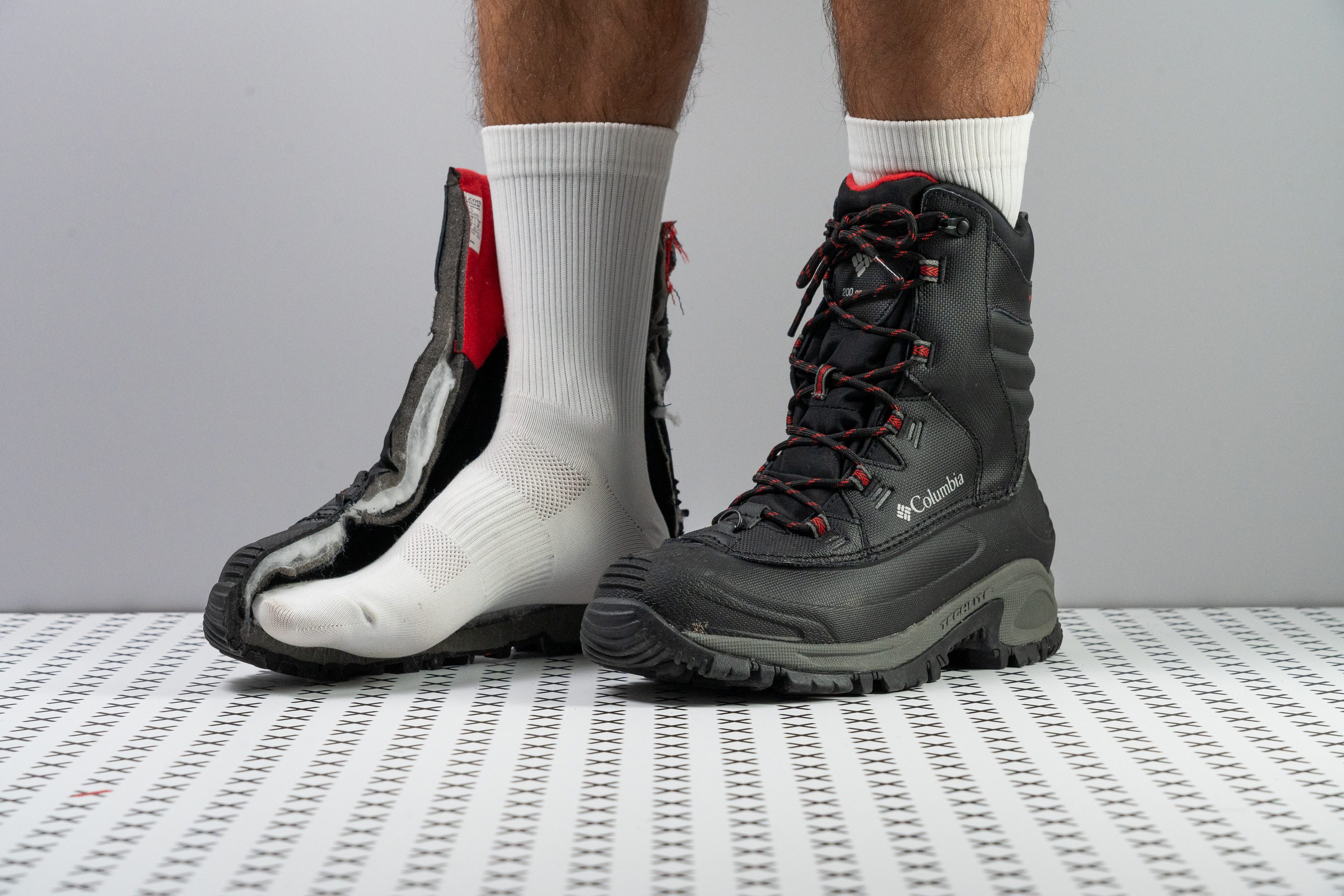






























What makes it the best?
The Bugaboot III is a clear winner when it comes to insulation in waterproof hiking boots! It became our best friend on sub-zero hikes and, in the lab, we tore it to pieces and got even more convinced that it does not get better than this when warmth is a priority.
Talk about insulation: the tongue. It's very thick at 14.2 mm! We went wild with the lace tightening and could feel no pressure on the instep. When we cut the shoe in half we could also see white fluffy insulation - the majority of it was placed in the tongue and over the toebox, and some behind the heel.
What's also great is that there's a lot of material between our feet and the ground. In very cold weather, this means a lot. Looking at the heel stack height, our calliper measured it to be 46.9 mm high! That's a record-high number for hiking boots. The average sits at 36.2 mm. So, there's 22.8% more distance from the ground than you'd experience in an average hiking boot.
The snowy and icy ground is a joke for the grip on the Bugaboot III. In the lab, we used a calliper and measured the thickness of the lug. They are 5.7 mm deep! That's 1.2 mm more than the average. And they did wonders in cold and wet weather.
A cherry on top is definitely the durability of the upper or, to be more precise, the toebox bumper. This protection is as hard as it gets. We tried destroying it with a dremmel and we barely made a dent. We rated the durability of this part with the highest rating: 5 out of 5! This is also how the boot feels - no worries about hurting your toes when hiking over ground covered with obstacles.
Want something crazy warm? You got it. The price you have to pay? Forget about breathability. We've pumped smoke into this boot and watched as it.. did not escape. Not through the upper, not through the tongue, not even through the eyelets. We rated the breathability of the Columbia Bugaboot III as 1 out of 5, 1 being the least breathable.
Pros
- Jaw-dropping comfort
- Remarkable insulation
- Watertight upper
- Excellent durability
- Plenty of cushioning
- High level of support
- Reliable grip
- Affordable for its kind
Cons
- Restrictive toebox
- Heavier than average
Waterproof hiking boots with the best support
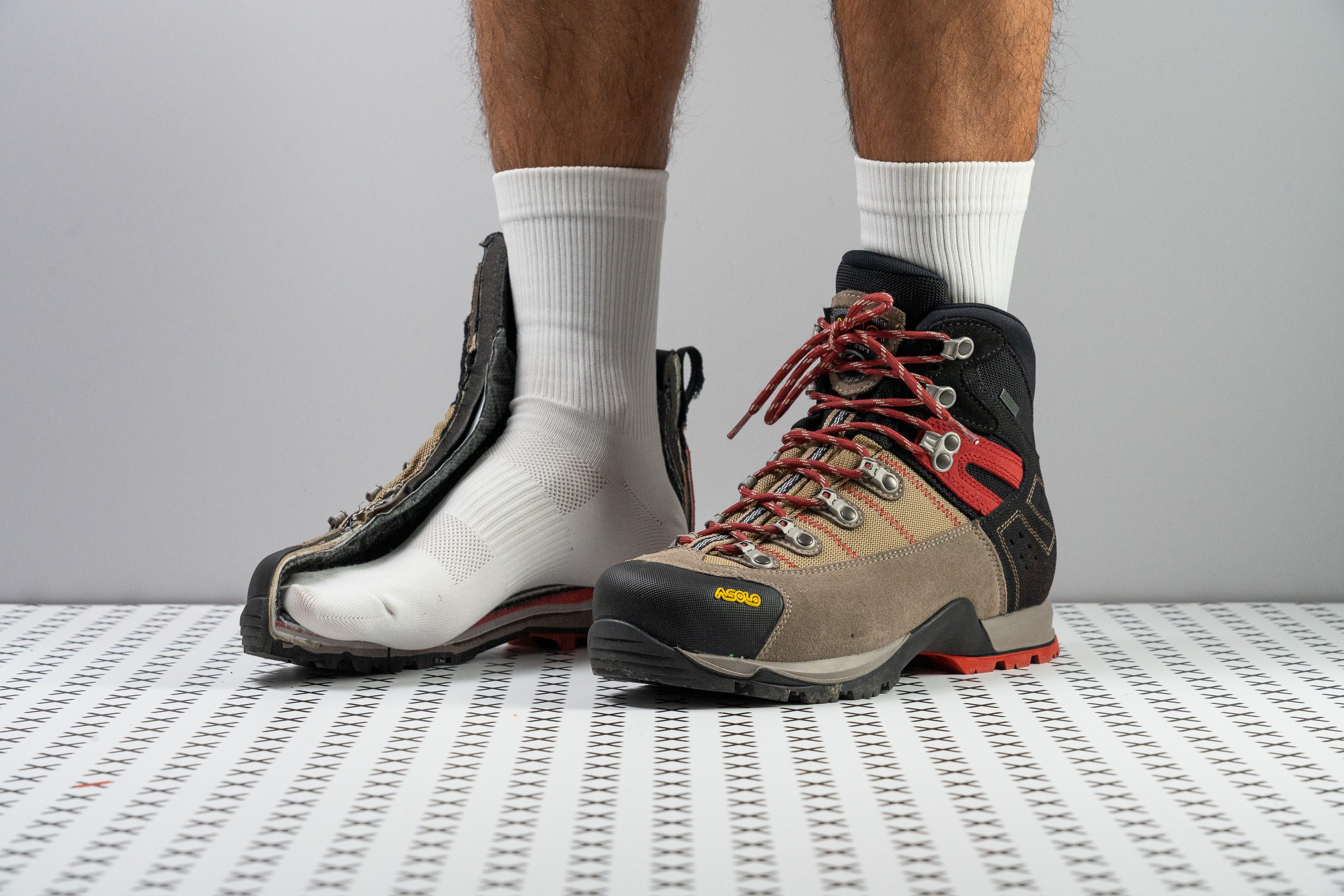















































What makes it the best?
Who’s for an adaptable, ultra-supportive hiking boot that keeps our feet dry and protected from bumps and scrapes on the trail? We certainly are, which is why we dubbed the Asolo Fugitive GTX the champion of supportive, waterproof hiking boots.
Whether on rough trails or carrying heavy packs, the Fugitive GTX never let us down. Its stable platform made us feel footsure and confident in all conditions, and it outshone the competition in our lab tests. We squeezed and pushed the heel counter, awarding it the stiffest rating of 5/5. Coupled with the 3 pairs of hooked eyelets which allow us maximum flexibility to get the lockdown we need, there is little chance for heel slippage in this boot. We also rated it 5/5 for rigidity, making the Fugitive GTX truly second to none in the support department.
As always, the Gore-Tex membrane keeps our feet dry even on the most torrential days, and the high collar and gusseted tongue stop water getting in while splashing through streams, puddles, and wet grass. We peered at the upper fabric through the microscope, and it’s really no wonder. The densely woven fabric makes it hard for anything to get through - not even light can peek through the pores! Our smoke tests confirmed our observations - the Fugitive GTX scored 1/5 for breathability, making it one of our least breathable boots.
Even after scrambling over sharp rocks, we noticed the Asolo Fugitive GTX showed barely a scratch. In the lab, we double-checked our findings by pressing a Dremel to the toe box at a speed of 5K RPM at 3.2N for 12 seconds. Sure enough, the robust rubber showed its mettle and left the tiniest hint of damage. We were left with no choice but to declare the Fugitive GTX the maximum 5/5 for durability. It stands up well to our Dremel tests on the outsole and heel counter, too.
Our lab tests confirm that the Asolo Fugitive GTX is not recommended for beginner hikers or those with wide feet. We measured the forefoot midsole to be around 5 mm narrower than average, and the heel 11.5 mm narrower than average. This translates to less room above to accommodate wider feet, but also a less stable landing platform for beginner hikers.
Pros
- Superb adhesion and traction
- Great impact dampening
- Worth the price
- Waterproof
- Reliably supportive
- Feels light on the foot
- Zero break-in
- Balance preserver
Cons
- Outsole started peeling off
- Not-so-cushy footbed
Best lightweight waterproof hiking boots
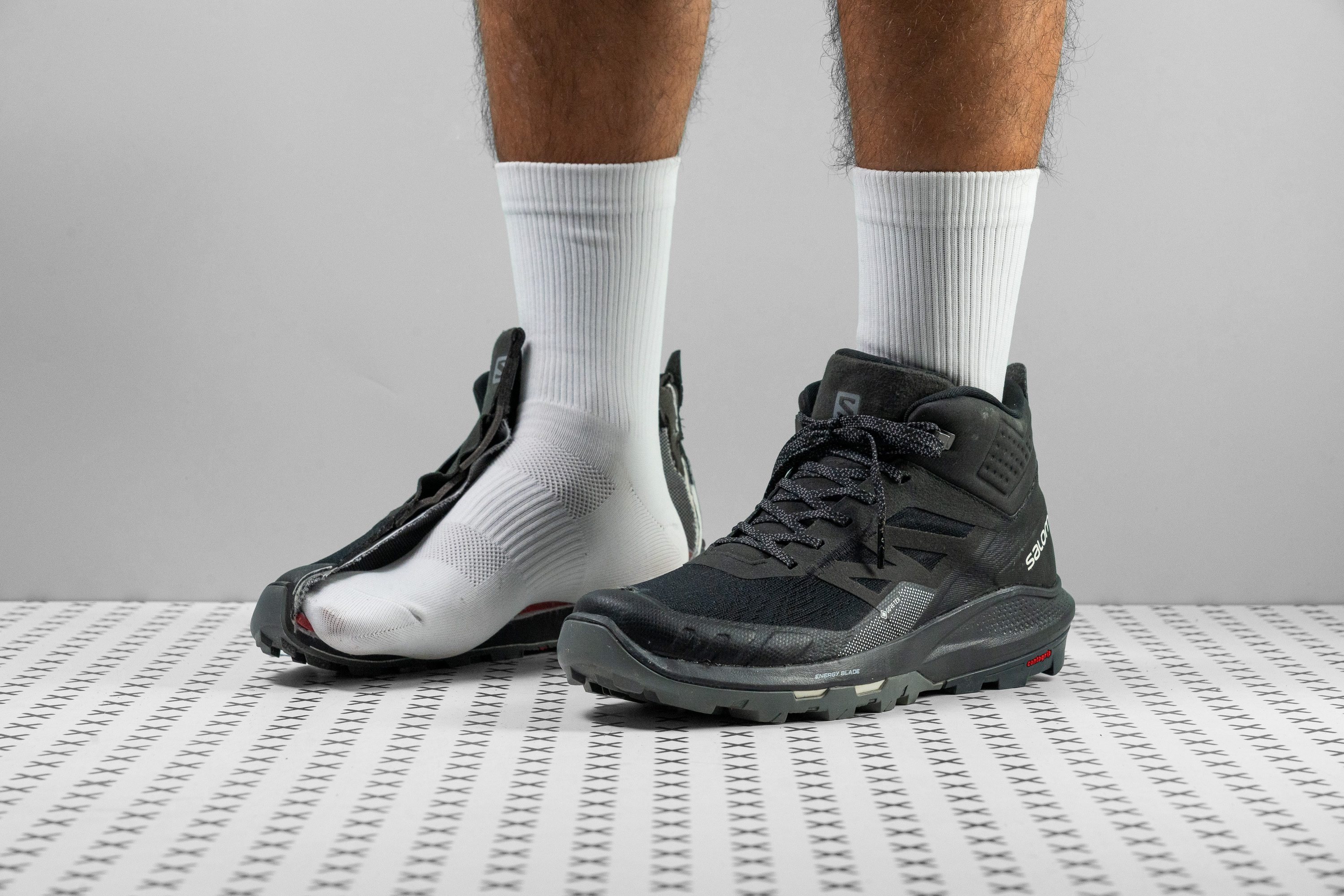












































What makes it the best?
We discovered the best lightweight waterproof hiking boot through lab tests and actual hikes — Salomon’s Outpulse Mid GTX. It gels the hiking and trail-running experience together by giving us a fast, lightweight, and agile boot. On top of that, we can cross streams and hike through rain confidently because it blocks water out.
We’re blown away by how light Outpulse is vs. the usual chunky boot. Upon checking, it weighs 13.6 oz (386g) — 4.8 oz lighter than the average hiking boot! We feel its significant weight reduction and low stack boosting our agility through better ground feedback.
We’re amazed at how fast we can effortlessly run with a boot! Outpulse is very responsive due to the stiff TPU Energy Blade that runs through the midsole. We didn’t feel tired after a long day of hiking because the cushion felt comfortable. And true enough, our durometer shows it’s 25.4% softer than average.
Its premium GTX membrane shielded us from cold air and water in all our wet encounters. We checked with our microscope and saw how tightly woven the material was. We’re sure of its waterproof defence as long as it remains below the boot collar’s level. Since the heel is quite loose and the laces aren't enough for lockdown, water crept in and we ended up with wet socks.
Pros
- Astonishingly light
- Comfy like a sneaker
- Excellent waterproofing
- Very durable build
- Soft and springy cushioning
- Low-to-the-ground platform
- Remains soft and flexible in cold weather
Cons
- Loose collar fit
- Not for technical terrain
2 features to look for in waterproof hiking boots
Use waterproof hiking boots when you know you will be hiking in very wet weather. Wet weather means
- You want your feet to stay dry at all times, and
- You need a superb grip so you don’t slip.
Because of this, you should look for 2 must-have features in waterproof hiking boots:
- Waterproof upper. Here, we also suggest boots with gusseted tongues because they prevent the debris and snow from getting inside the boot, and if you plan to hike in deep snow, consider getting waterproof gaiters as well. They can’t hurt, they can only help in that case.
- Lugs (grip) that will keep you safe and planted on the hike. Go for deep lugs (4 mm or deeper) if you plan to hike in mud/slush/snow, and choose shallower lugs if you plan to hike on harder surfaces.
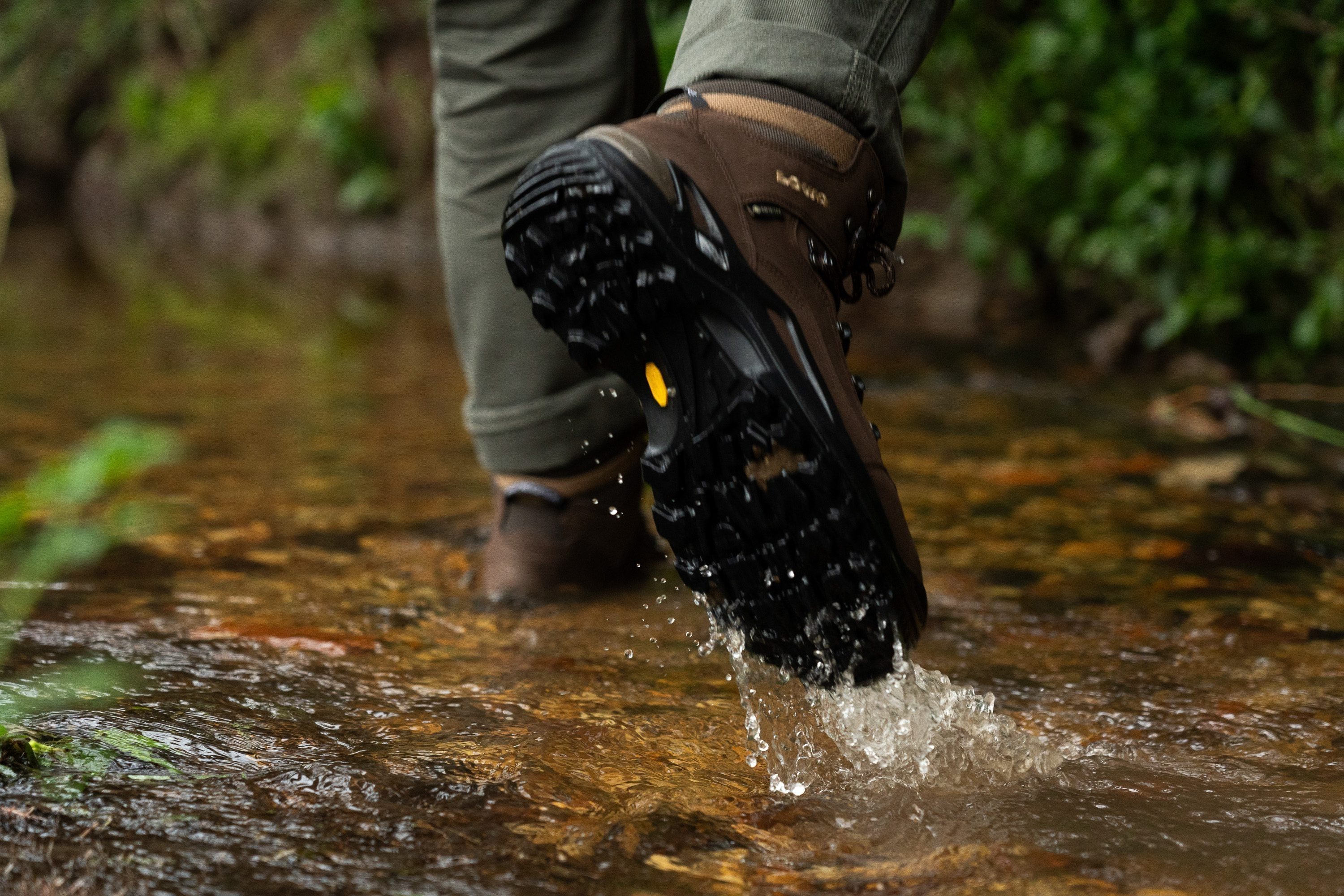
When NOT to use waterproof hiking boots
If only light rain is in the forecast or it’s a bit of wet grass and nothing else, consider getting water-repellent, water-resistant, or regular hiking boots. There are a few reasons why it’s best you’re sure you need waterproof hiking boots:
- Waterproof hiking boots don’t breathe well. And if the water gets inside (your feet sweat), there’s no way for it to get out.
- They are more expensive because waterproof membranes are not cheap.
You might be OK with a lower level of protection against water.
Consult this table:
| Water-resistant | Water-repellent | Waterproof | |
| General characteristics | a tightly woven fabric that is naturally capable of resisting water upon contact | fabric treated with durable water-repellent (DWR) or hydrophobic chemicals | -fabric treated with DWR -have waterproofing membranes like Gore-Tex and OutDry -have seam-sealed construction for extra protection |
| Water protection level | low water protection | moderate water protection | high water protection |
| Water pressure resistance | 0-5000 mm (no pressure or moisture) | 6000-10000 mm (light pressure) | 10000-20000 mm (high to very high pressure) |
| Weather conditions best used in | light rain shower and dry snow | light rain and average snow | moderate to heavy rain and average to wet snow |
How to recognise waterproof hiking boots
Waterproof hiking boots have a waterproof membrane laminated with the upper material. The most common waterproof material is called Gore-Tex or GTX. However, it is not the only waterproof material present in hiking footwear. Many brands develop their own waterproof membrane but all of them specify on the box (and, often, on the shoe) that it is waterproof.
Best to look for a) the name of the waterproof membrane or b) “waterproof” or “WP” on the shoe or on its box.
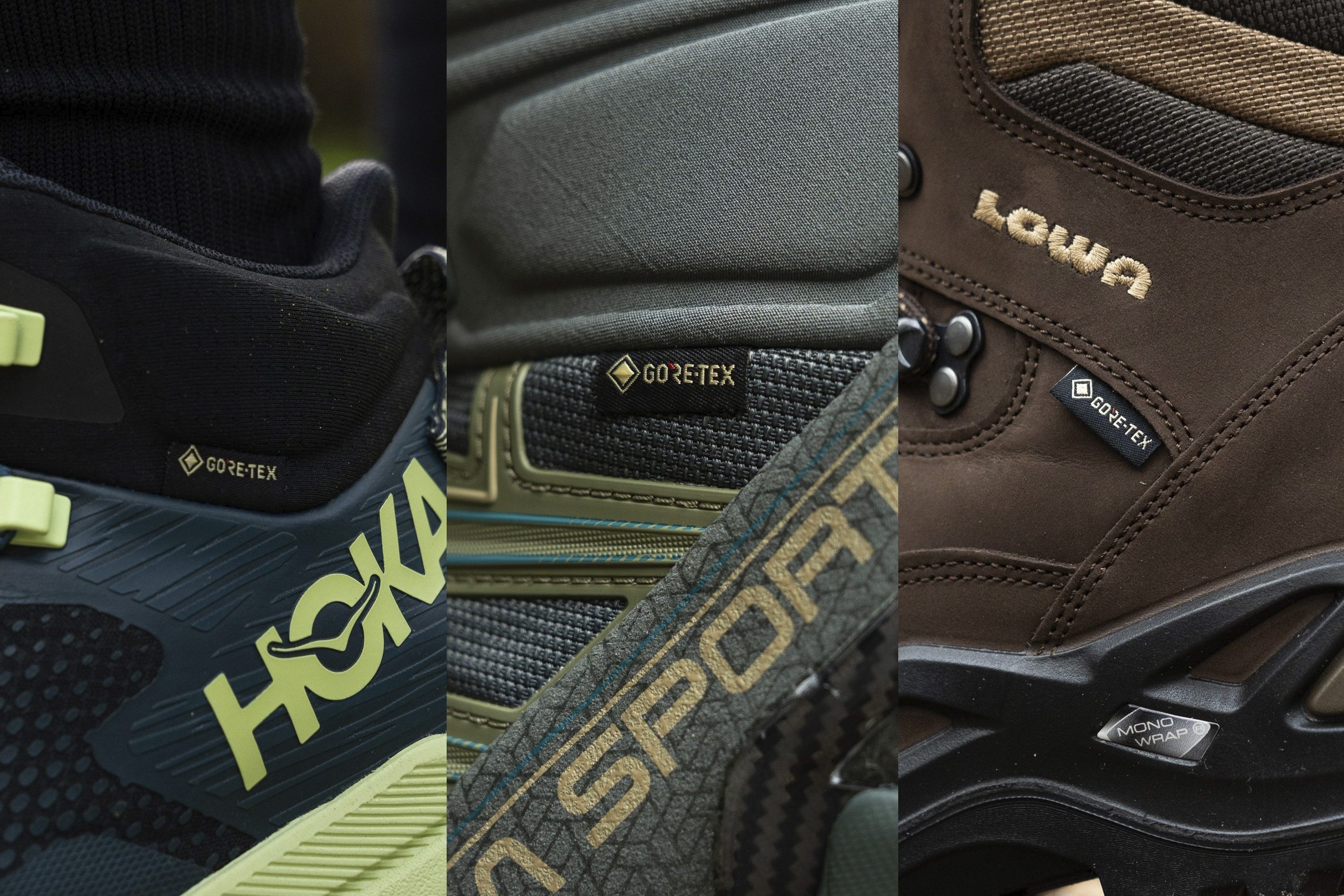
A few other examples of waterproof materials:
- KEEN.Dry waterproof lining present in KEEN hiking footwear
- Omni-Tech used in Columbia hiking boots
- DannerDry waterproof membrane by Danner
that you can also look for on the shoe itself (or its box).
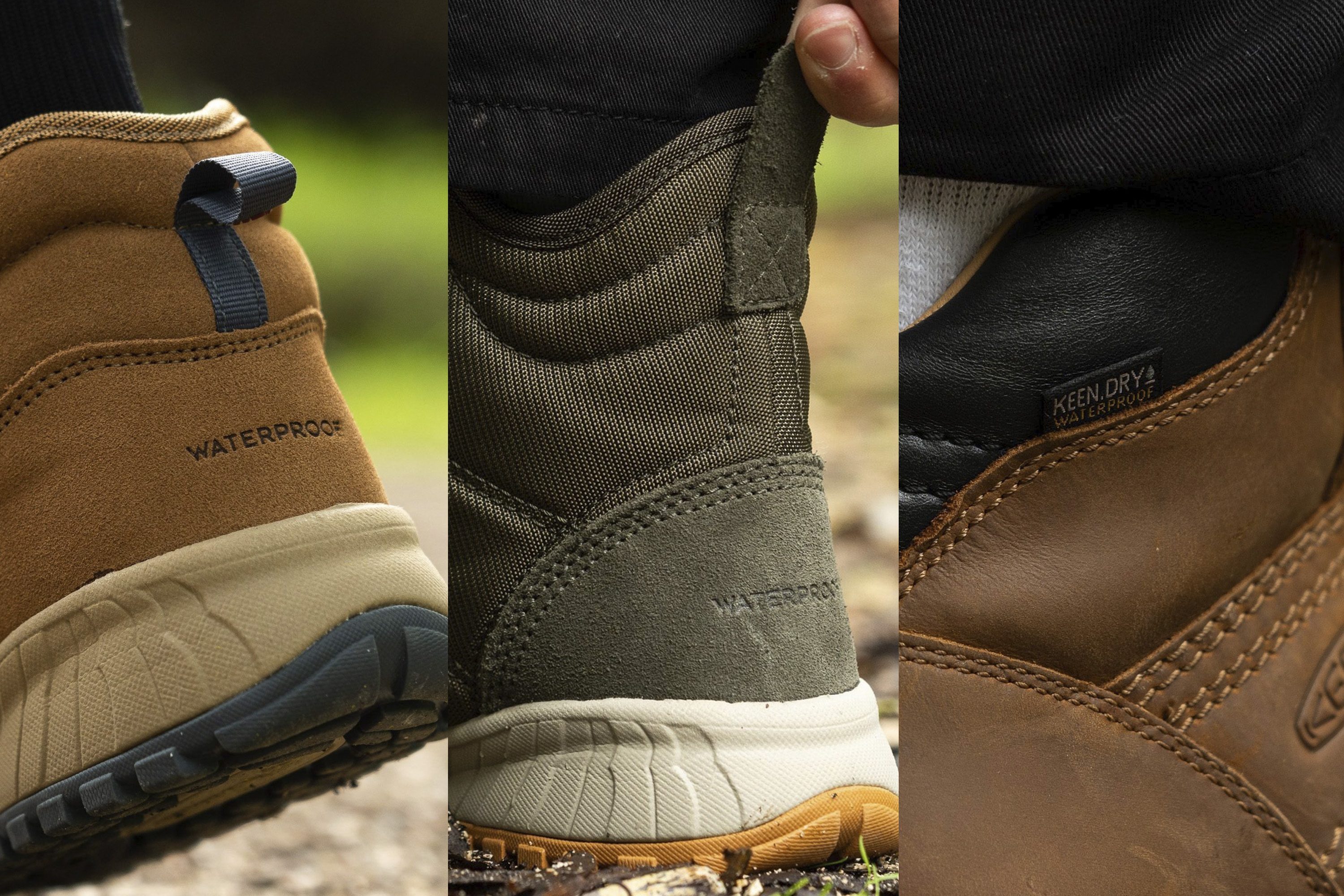
Gusseted tongues and gaiters: Double yes
Tongue can be:
- free (not connected to the sides of the boot, only to the toebox)
- Semi-gusseted (connected to 1 side of the boot)
- Gusseted (connected to both sides of the boot, below the eyelets).
Gusseted tongues do a great job at keeping the debris and water (slush, snow, mud) outside of your boots.
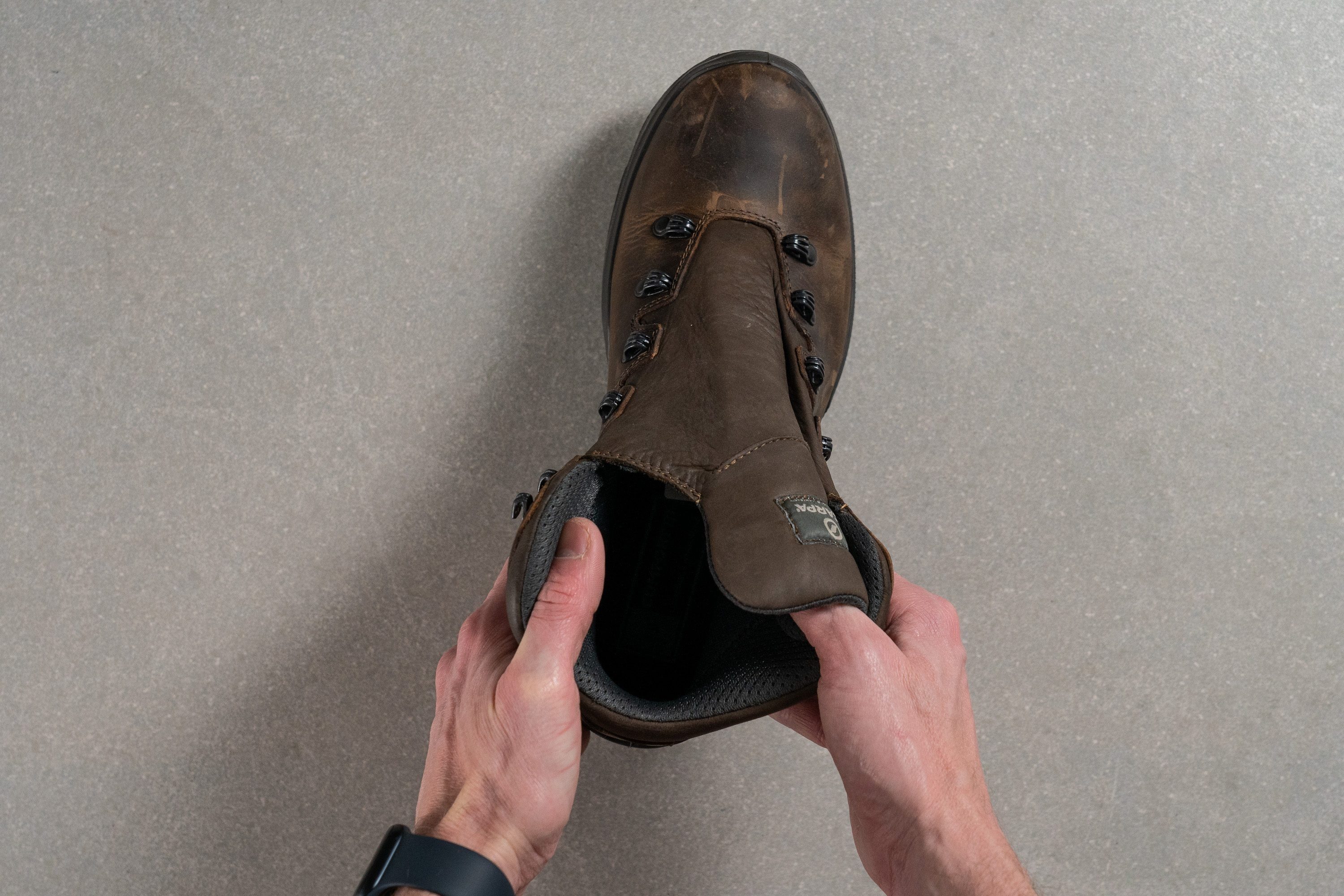
However, if you know that you’ll be hiking in very wet weather, consider upping the ante with the gaiters. They also come in waterproof variants (GTX or other materials) and are great at keeping your feet and lower legs dry!
WORST breathability results in waterproof hiking boots
We test all the hiking boots on our test hikes and in our lab. This allows us to have a complete picture of how a certain boot feels and performs. When it comes to breathability, we perform a standardised test on all boots which lets us rate the breathability on a 1-5 scale.
Waterproof hiking boot that scored 1/5 on our breathability test (left) vs. a non-waterproof boot that scored 4/5 (right)
We use a smoke machine and pump the smoke into the boot. Then, we watch as the smoke comes out: where it comes out and at which pace. In non-breathable shoes (breathability rating: 1) the smoke does not come out or only some of it comes out, usually not through the toebox where breathable boots would breathe.
Laminated GTX membrane seen on the inside of the waterproof hiking boot
Unlike regular hiking boots, waterproof ones have an extra layer: waterproof membrane. Although manufacturers like Gore-Tex claim that their materials are breathable, we’ve seen it again and again that they are not. Or at least not enough to be compared to the regular materials who can rate 4/5 and 5/5 on our breathability test.
What also does not help with breathability is the padding on the tongue. While it’s great to have it, because it provides additional warmth and prevents a lace bite when you tighten the laces, it might cause additional sweating when too thick and the boots are not used in very cold weather.
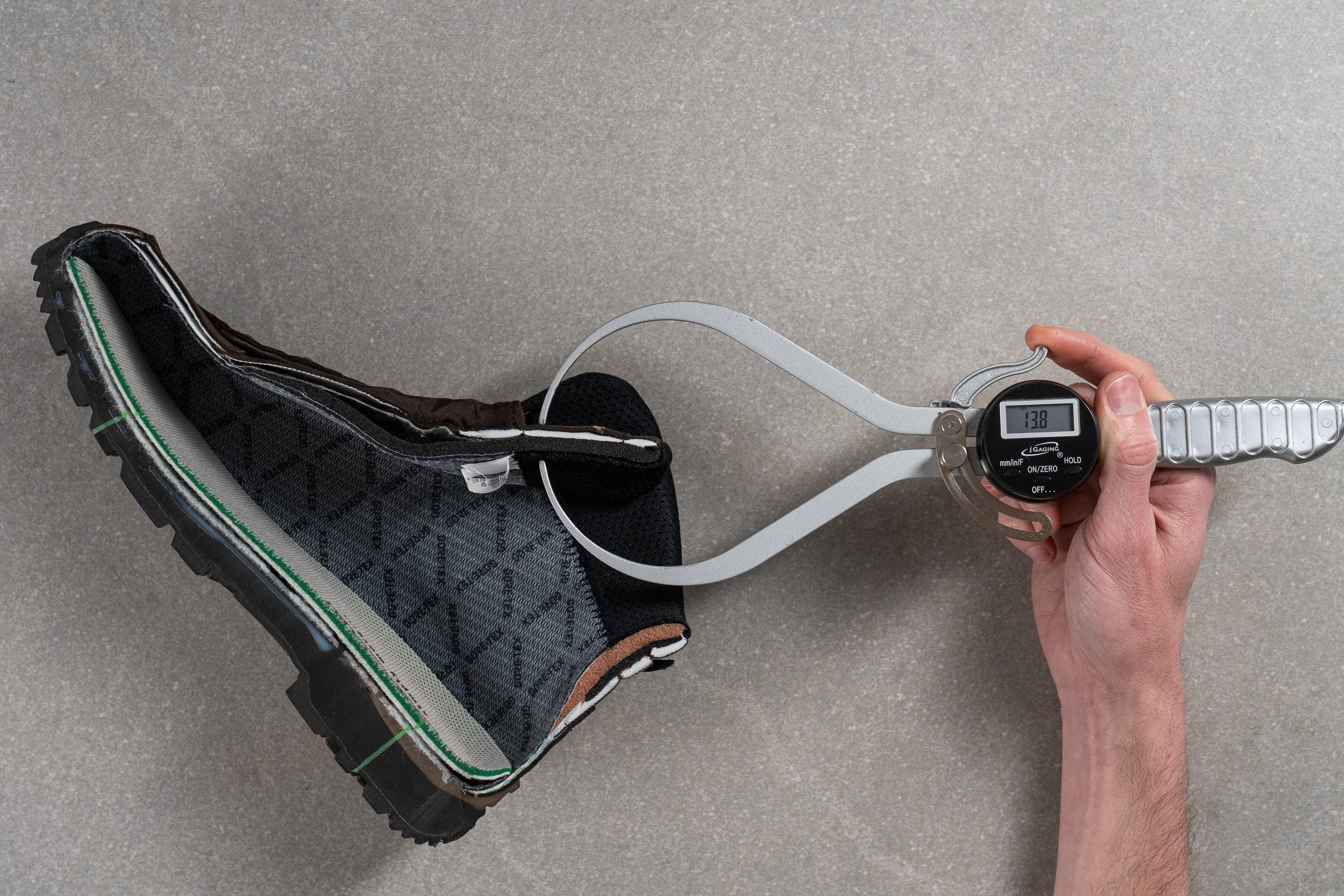
If you find this curious, look for our measurements in hiking boot reviews. We use a digital calliper to measure the padding and note it down.
Waterproof material under the microscope
A part of doing our breathability test is looking at the upper under the microscope.
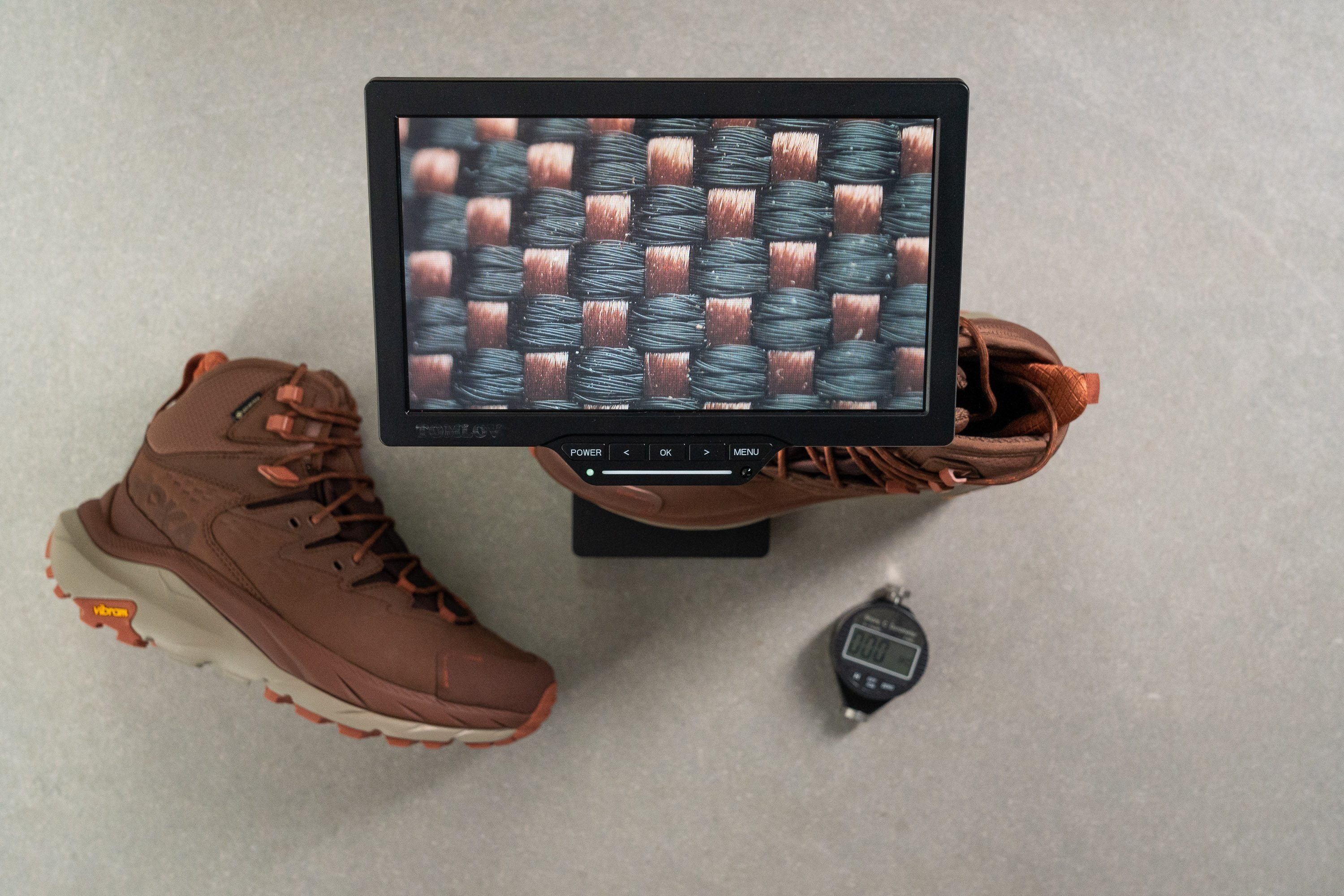
This allows us to see how breathable, non-waterproof uppers have a more loose structure and sometimes even ventilation holes. With waterproof uppers, it is just the opposite.
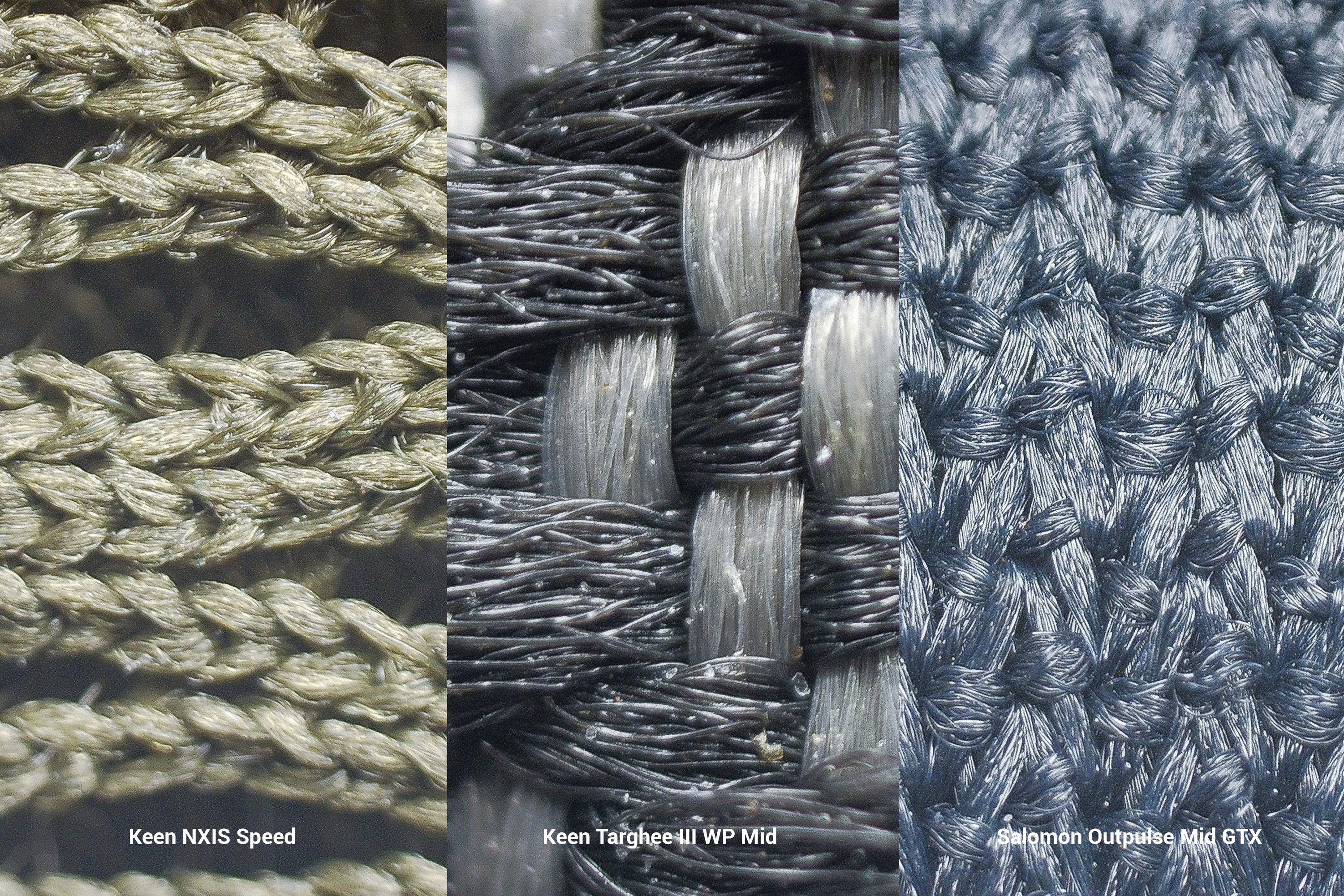
This only confirms what we’ve seen on the smoke test.
How not to slip in waterproof hiking boots
First, you should know what type of terrain you’re going to cover. It’s obviously going to be wet, but are we talking about soft ground or hard ground? Rocks or mud?
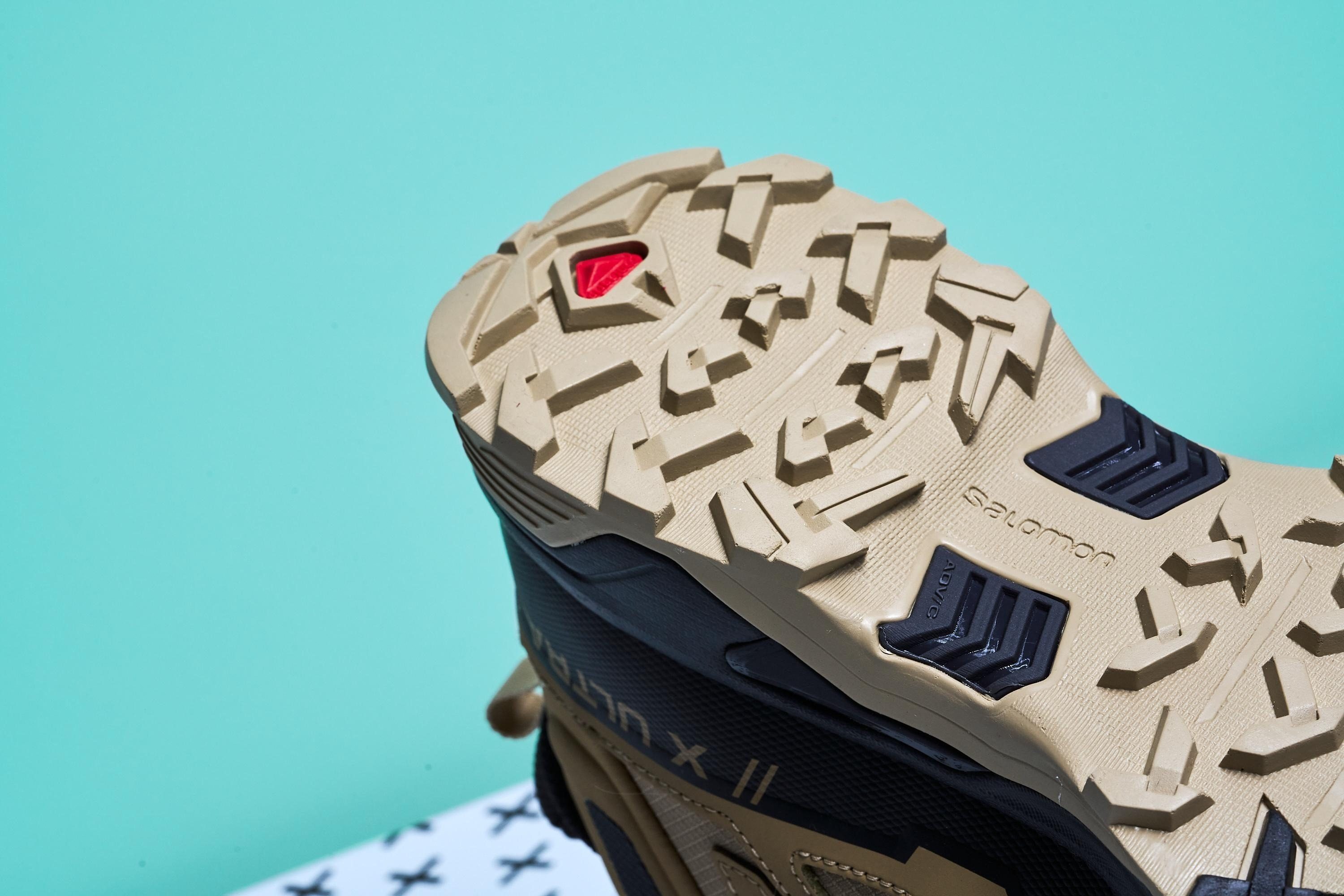
Here are our general guidelines, backed by hundreds of wear tests and lab tests:
- Choose shallower lugs (less than 4 mm) if you plan to cover wet hard ground. Rocks, hard-packed gravel, etc.
- Choose average lugs (around 4mm) if you plan to do a bit of everything but nothing too demanding/extreme. These lugs should be denser.
- Choose deep lugs (thicker than 4 mm) if you plan to hike in muddy, snowy or slushy areas. These lugs should be spaced further apart to allow for better mud shedding.
In our lab, we always measure the thickness of lugs, so we’ve got you covered.
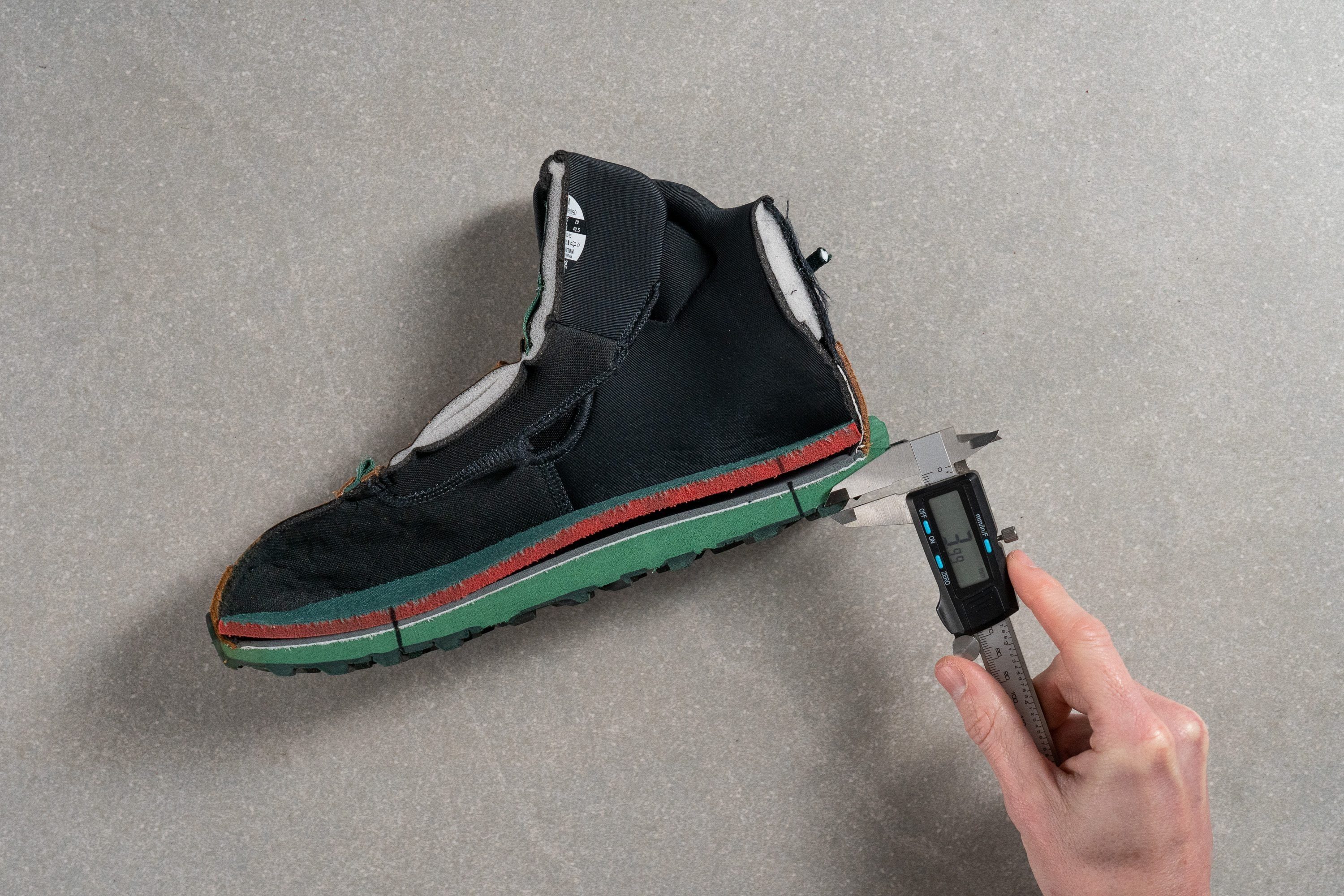
Grip is not about the lug thickness only, the hardness of the outsole rubber also plays a role. Generally, harder rubber offers more protection (from sharp rocks, debris) andis more durable. Softer rubber tends to be stickier but less durable, which is why it is not recommended to use soft outsoles on hard ground.
Another lab test and we’ve got you covered again. We use a durometer to measure the hardness of the rubber. The lower the number, the softer the rubber and vice versa.
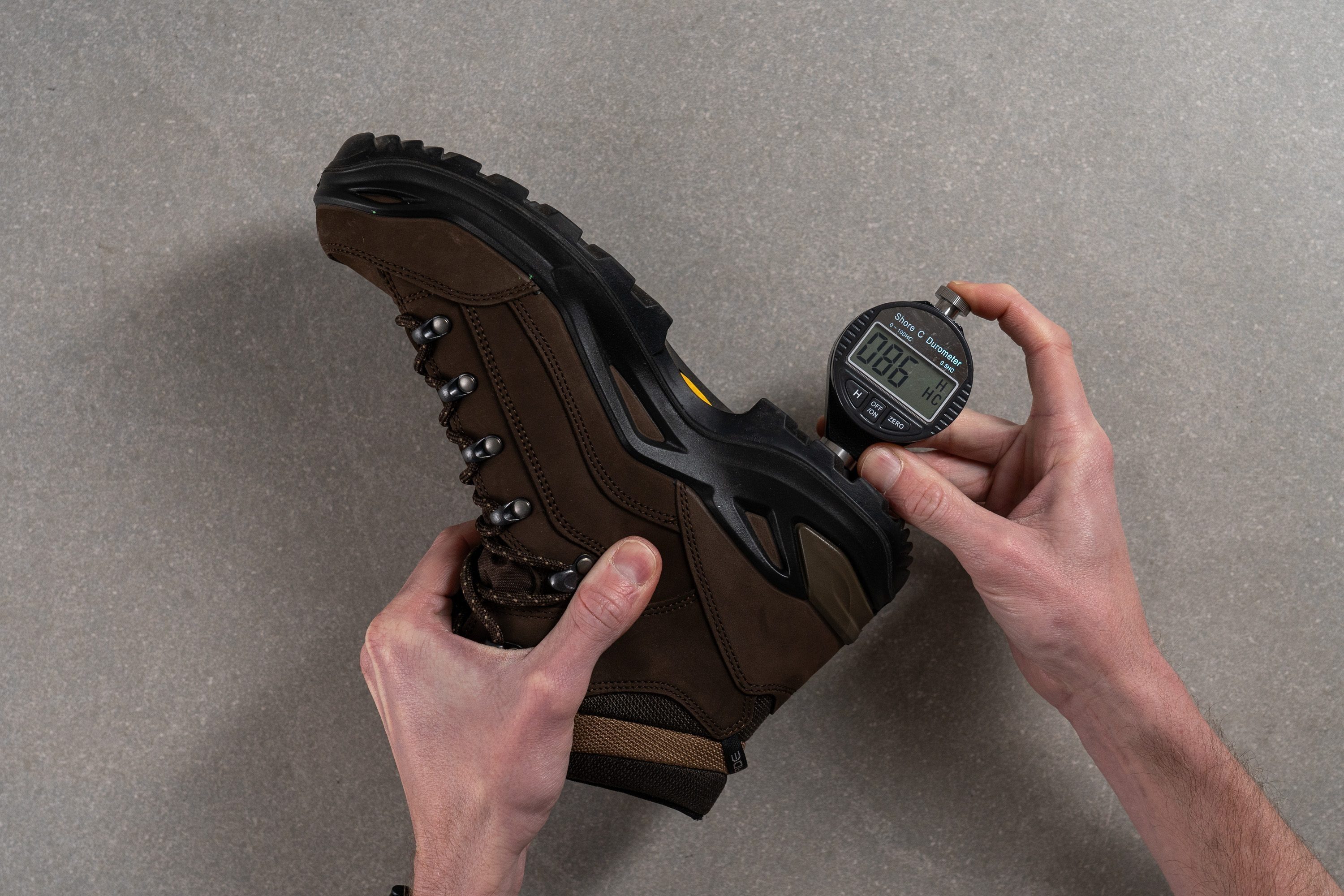
Testing durability of waterproof hiking boots
Hiking in wet weather can put the hiking boots to a very good test, one where durability comes to light. In our shoe lab, we test durability on 3 parts of the hiking boot: toebox, heel counter, and outsole.
Toebox durability test
In all 3 cases, we press a Dremel against the boot. In case of a toebox and heel counter durability, we assess the durability on a 1-5 scale based on the damage the dremel has made.
Testing the durability of the heel padding with a dremel in RunRepeat lab
This way, toe boxes and heel paddings that have a rating of 1/5 for durability are the least durable and those rated 5/5 are the most durable.
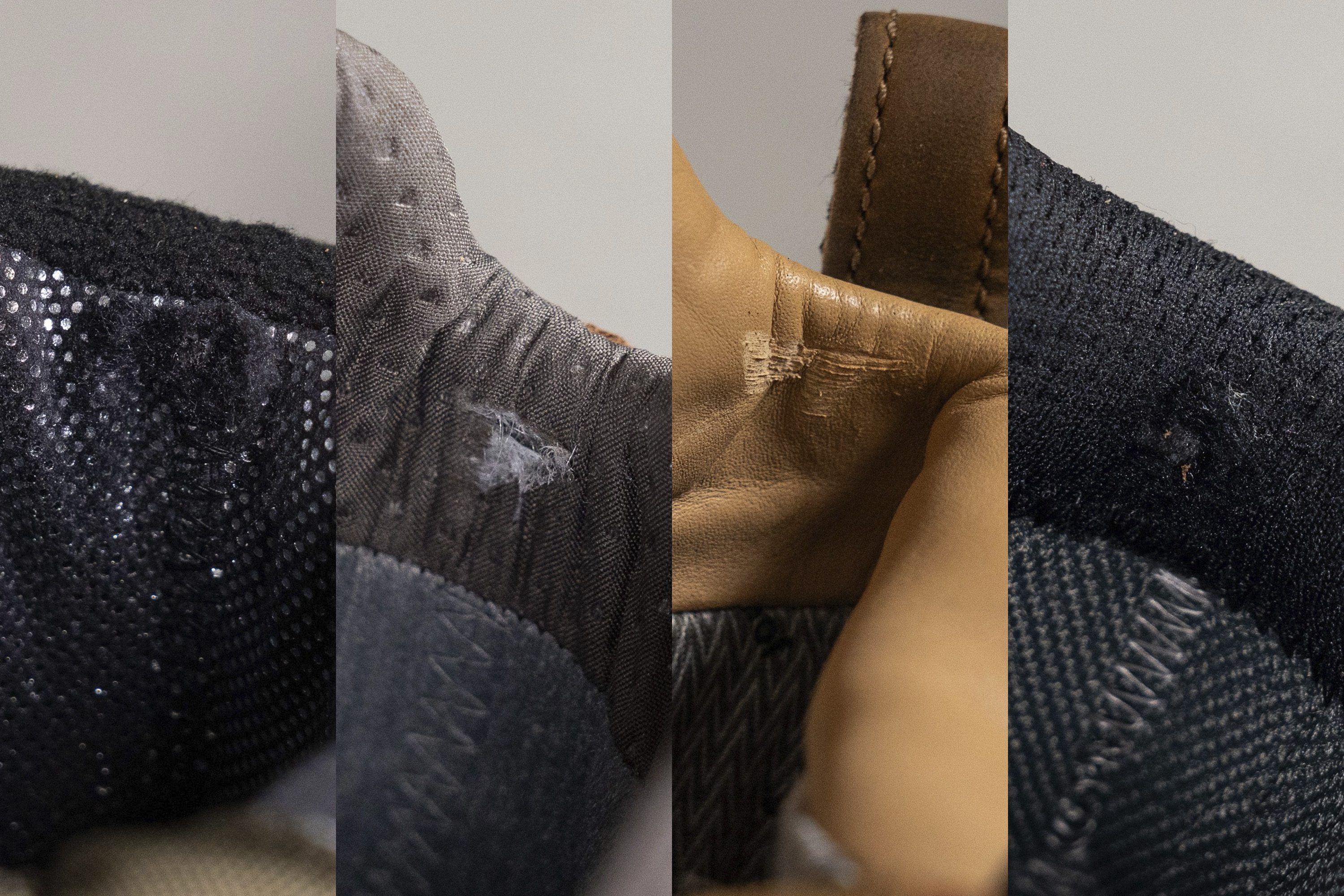
When it comes to the durability of the outsole, we use a tyre tread gauge to exactly measure the dent made by the dremel.
Using a dremel to test the durability of the outsole in RunRepeat lab
The shallower the dent, the more durable the outsole is.
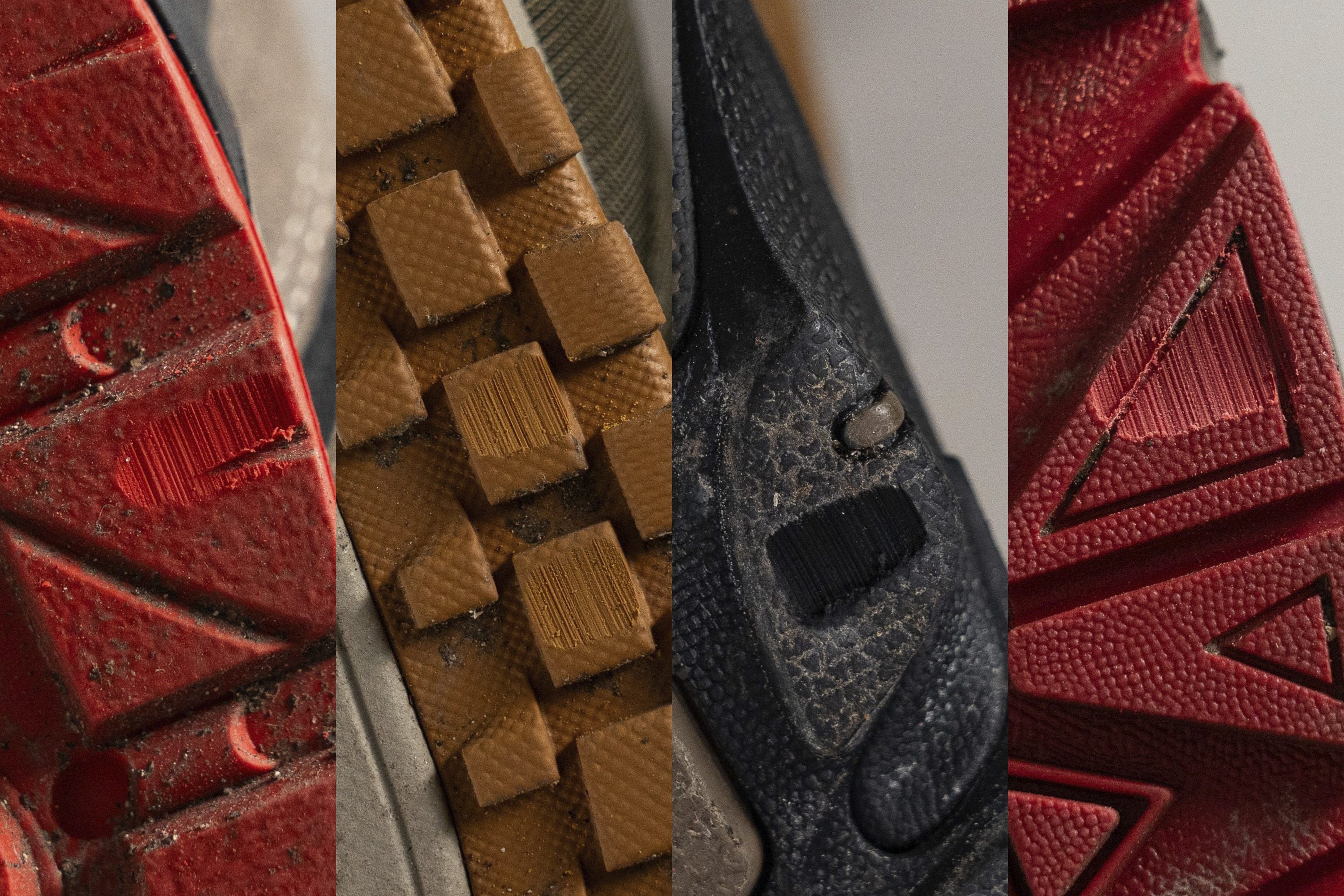
With this in mind, you can look for the most durable waterproof hiking boots and prioritise the durability that you want most.
Keep it STABLE when hiking in wet weather!
Stability is very important when it comes to hiking, especially when doing so in wet weather which means the terrain can be slippery.
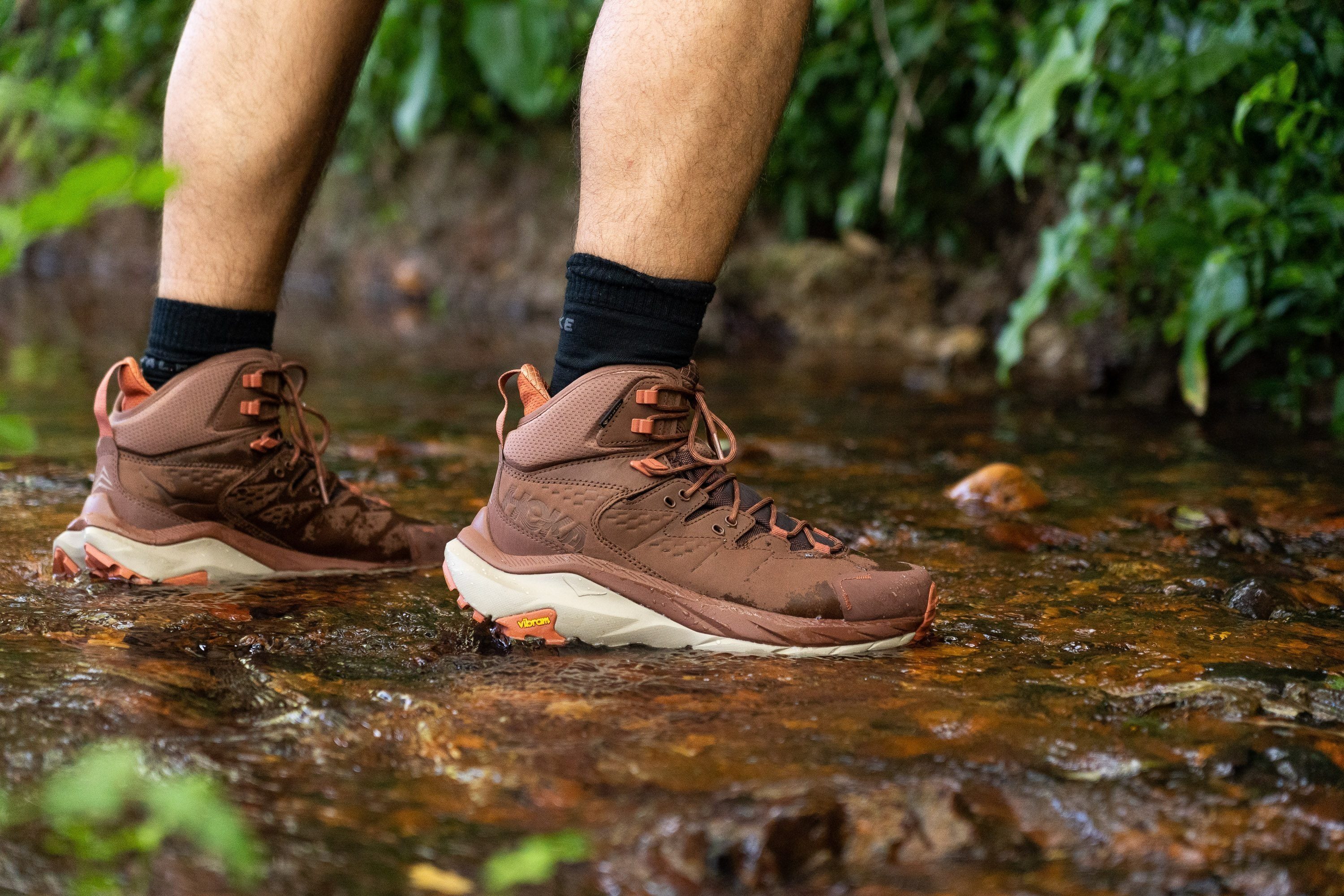
If you add a heavy backpack or uneven terrain to that, stability really gets prioritised!
On our test hikes, we always check whether the boot feels stable (lateral stability).
Testing lateral stability in waterproof hiking boots during a wear test
But, in the lab, the numbers that tell us whether the shoe is stable or not are measurements of the width of the base. Narrower and higher bases (midsoles) are easier to tip over, while wider bases allow us to feel planted and secure when hiking.
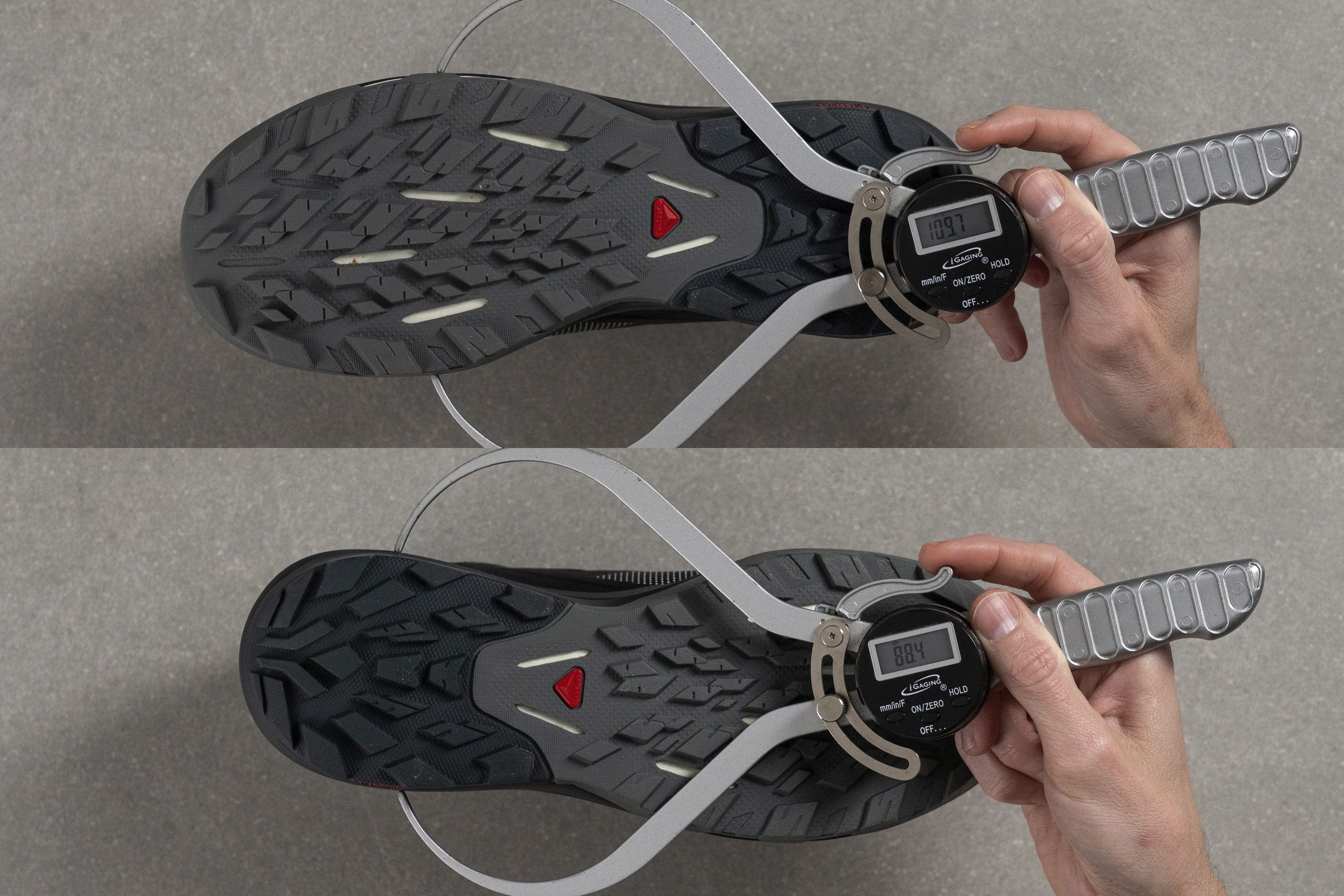
These are top waterproof hiking boots that we tested with the widest midsoles:
Not sure about the fit of your boots?
If you never bought hiking boots before, it’s a good idea to stick to these guidelines:
- Try the hiking boots later in the day, afternoon or evening. We advise this because by then your feet are most likely swollen a bit from the full day of activities. Swelling happens on the hike as well, so best to try and replicate the conditions.
- When trying the boots on, take your hiking socks with you. Orthotics as well, if you’re using them.
- Once the boots are laced up, sense if there are any hot spots. There shouldn’t be any.
- You should have 1-thumb width of room in front of your toes when you glue the feet towards the back of the boots.
- Use the ramp if trying the boots in a specialised store. Walk up and down, sideways, over the rocks, artificial grass, etc. Your heel should not be slipping. Your feet should not be sliding inside the boots.
Also, keep in mind that most hiking boots need some breaking in. Don’t take them straight out of the box to a long multi-day hike.
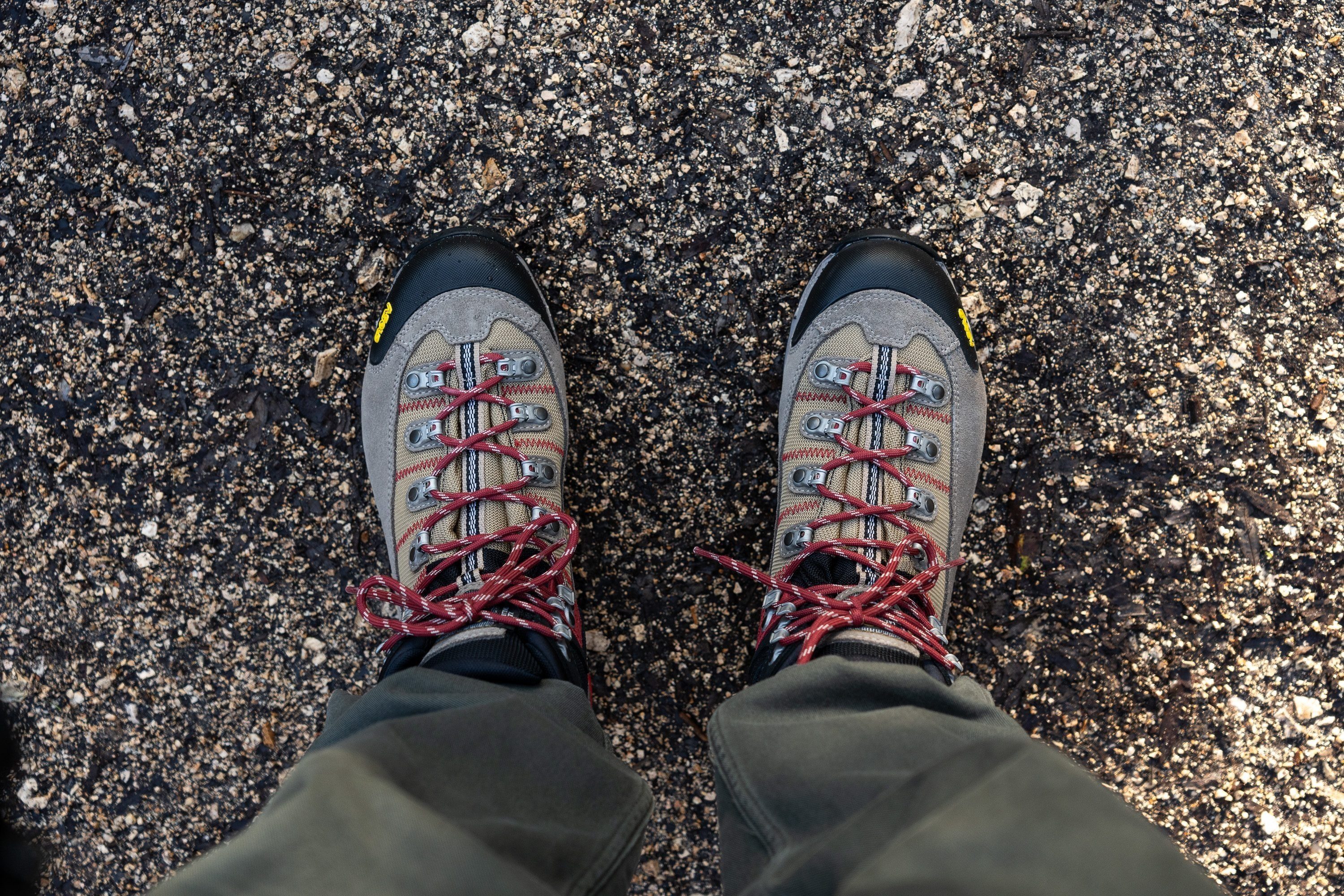
Best socks for waterproof hiking boots
Given how lousy these boots scored on our breathability tests, look for socks that have moisture-wicking features. The best, in our experience, are those made of wool and bamboo.
We don’t recommend getting waterproof hiking socks in the combination with waterproof hiking boots. The non-breathability of both is a recipe for disaster (blisters, at least).
 Hiring remote: Content writer / review specialist in
Hiring remote: Content writer / review specialist in 
